



Co-op is recognised as the ‘UK’s best funeral plan provider’ by Moneynet 2021











Co-op is recognised as the ‘UK’s best funeral plan provider’ by Moneynet 2021










Plan your funeral with us and choose how you want to be remembered. We’ll make it personal, every step of the way.
Our award-winning plans start at £3,095 or £18.96 per month.*



Start your plan at coop.co.uk/funeralplans or visit your local funeral home


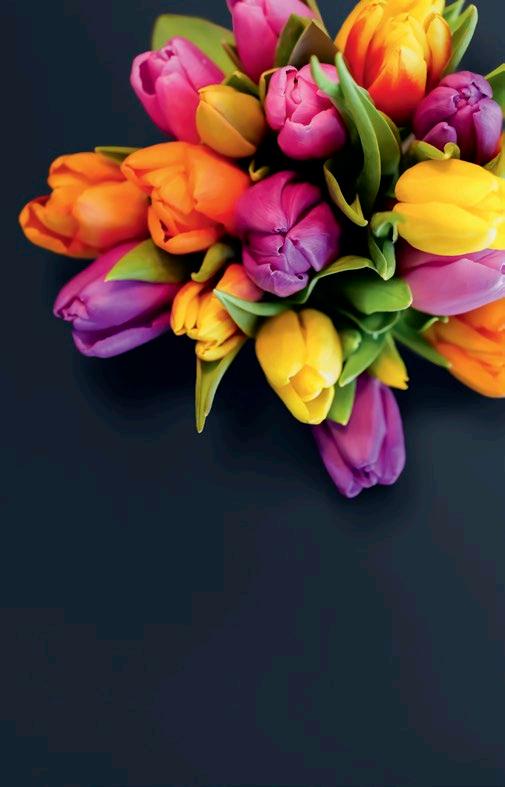

Co-op Funeralcare is a trading name of Funeral Services Limited, a registered society registered in England and Wales with registration number 30808R and registered office 1 Angel Square, Manchester, M60 0AG. VAT registered 403 3146 04. Part of Co-operative Group Limited.






*£3,095 is the price of a Simple funeral plan. £18.96 per month is based on a 50-year-old purchasing a Simple funeral plan at £3,095 over 25 years (total repayable £5,789.32). Terms and conditions apply.








16 IT’S A MANN’S WORLD Olly Mann ponders whether having limited choices is actually a blessing in disguise
ENTERTAINMENT
20 INTERVIEW: SIR DEREK JACOBI
The legend of stage and screen on lockdown, literature and the love of his life
28 “I REMEMBER”: TOYAH WILLCOX
The British musician opens up about her childhood, overcoming life’s difficulties and marriage to Robert Fripp
HEALTH
36 HEART DISEASE IN WOMEN
Heart disease is the single biggest killer of women worldwide. So why is it still considered a man’s problem?
54 INTERMITTENT FASTING
Everything you need to know about the popular diet trend, including its potential harms


INSPIRE
70 THE ART OF MEDITATION
A hardened sceptic tries meditation for the first time
76 TRAPPED UNDER WATER
His air-supply cord severed, commercial diver Chris
Lemons had minutes to live— discover his incredible story
90 ICE CREAM IN JAPAN
The weird and wonderful flavours of Japan’s cultural identity
In Vietnamese, Ngan’s name means “star,” but she wasn’t able to smile brightly because she was born with a cleft condition.
Ngan’s family lives in a small, isolated village in southern Vietnam. Without help, her family would never have been able to afford the reconstructive surgery that would change Ngan’s life and give her a brighter future. But when Ngan’s parents heard that Operation Smile was conducting a surgical mission in Danang, they did everything in their power to bring Ngan to there medical mission. Ngan and her family travelled more than 200 miles for the chance to give her a new smile.


Ngan received life-changing surgery on her cleft lip and palate and now, 10 years later, she is a happy, healthy, vibrant girl –with a smile that shows it.
Before she had surgery, Ngan’s facial condition hindered her social engagement and even her involvement in school. Now, with the confidence she gained from her new smile, Ngan can reach her full potential. Ngan’s parents say they had given up everything but hope before Operation Smile gave their daughter the chance to see her dreams become a reality. “Many families in
our province will abandon their child if a baby is born with a cleft,” Ngan’s father said. He never wants this to happen, knowing how incredible the transformation is with a free surgery through Operation Smile. Ngan’s parents now actively refer other families of children born with cleft conditions to Operation Smile. They are determined to ensure that every child has the opportunity for a brighter future, regardless of their appearance.
Operation Smile has provided hundreds of thousands of safe surgeries for those born with cleft conditions worldwide.
If you would like additional information please visit: www.operationsmile.org.uk/Star call 020 3475 5126 or write to: Operation Smile UK, Genoa House, Juniper Drive, London SW18 1FY
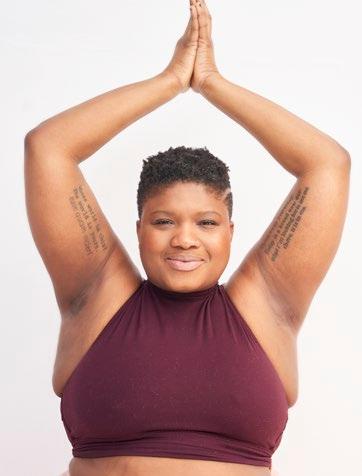



SENIOR EDITORS Anna Walker, Eva Mackevic
EDITORIAL ASSISTANT Marco Marcelline
ART DIRECTOR Richard Cooke
ADVERTISING Jigs Pankhania
HEAD OF FINANCE Santwana Singh
FINANCE MANAGER Irving Efren
MANAGING DIRECTOR Julie Leach
CHAIRMAN Gary Hopkins
subscriber enquiries, please
WE PAY...
£50 for the star letter and £30 for regular letters.
Email readersletters@readers digest.co.uk or go to readers digest.co.uk/contact-us
WE ALSO PAY...
£30 for the true stories, anecdotes, jokes in Laugh! and You Couldn’t Make It Up…, and contributions to end-ofarticle fillers and My Great Escape.
Email excerpts@readersdigest.co.uk or go to readersdigest.co.uk/contact-us
We cannot acknowledge or return unpublished items or unsolicited article-length manuscripts. Do not send SAEs. Article-length stories, poetry and cartoons are not requested.
TRUSTED MEDIA BRANDS INC (USA)
President and Chief Executive Officer
Bonnie Kintzer
Editor-in-Chief, International Magazines
Bonnie Munday
number below
Contact Customer Services for renewals, gifts, address changes, payments, account information and all other enquiries. Call 0330 333 2220* or email customer_service@readersdigest.co.uk
Reader’s Digest is also available in audio and accessible etext editions from RNIB Newsagent, for blind and partially sighted readers. Call the RNIB Helpline on 0303 123 9999 or visit rnib.org.uk/newsagent
Annual subscriptions are available to be delivered monthly direct to your door. For our latest offers please visit readersdigest.co.uk/subscribe Or telephone us today on 01778 392461
Gift subscriptions also available. UK rates may vary. Overseas rates: Republic of Ireland €50, Rest of the World €60.

What our customers say:
































Thank you, thank you, thank you. I have never slept better in my life, and it is because my husband has never slept better in his life. My nights have gone from him flopping all around and giving me a concert with his snoring.
After using MyPillow he goes right to sleep and wakes up in the same position he fell asleep in all in peaceful silence. Now I don’t need a pillow to cover my ears. - Gemma


Get two pillows for £59.95 when you use promo code:
*Delivery charges / restrictions may apply. Offer valid for a limited time only. Must have promo code to receive discount. Cannot be used in conjunction with any other offers. Full terms and conditions available at mypillow.co.uk/terms 0800

The end of a season marks new beginnings, and as the hot summer days draw to a close, and the trees begin to fill with the golden tones of autumn, the moment is ripe for reflection. What better time, then, to take an honest look at your mental health, and ask yourself what you could be doing to better support your brain? On p70, a former meditation sceptic discovers the very real benefits of working moments of concentrated calm into his day. A former cynic myself, the feature is a timely reminder that—much like the mental benefits of physical exercise—working out your mind, and developing discipline over your racing thoughts can make a big difference to your state of mind.
Not convinced? Humour me. Find a quiet space, take a deep breath, and try it for yourself.
Food plays such an important part when it comes to cultural identity of countries, cities, and even towns and villages. You know you’re in Venice when you’re holding a cone of freshly fried seafood; you can’t visit Berlin without sampling the iconic currywurst; and breakfast bagels are a must when roaming the streets of New York. On p90, we take a trip to Japan where we trial the flavours of a beloved Japanese classic: no, not sushi or ramen—soft ice cream. You might be surprised to learn that “soft cream”, as they call it there, is part and parcel of Japanese culture, closely knit to nostalgic memories of travel, friends and new discoveries. Each town showcases its cultural identity through its trademark flavour like squid ink, lavender, or even—gasp —ocean brine. Go on, give it a whirl!

facebook.com/readersdigestuk
twitter.com/readersdigestuk
@readersdigest_uk
You can also sign up to our newsletter at readersdigest.co.uk
Reader’sDigestis published in 27 editions in 11 languages
LETTERS ON THE June ISSUE
We pay £50 for Letter of the Month and £30 for all others
Your piece on Sigourney Weaver introduced me to another side of the actor—perhaps I was guilty of being one of those who expects Weaver to have a flamethrower in her purse. For me, this is not just because of her awesome performance in the Alien movies, but thanks to the strength she always seems to exude in the roles I’ve seen her in. I never knew she had an English mother who was an accomplished actor and a US TV titan as a father. Perhaps they both contributed to the extraordinary focus Weaver has displayed in her
I enjoyed your feature “Falling In Love, By The Book” and loved Karla‘s story. Having read more about her, I learned that she is a lifelong reader with a BA in English and a Master’s in Afro-American

film work and the utterly believable perseverance characters like Ripley exhibit. I loved her musings on how the audience that she really strives to connect with is “a woman who wants to be taken out of herself for a couple of hours”. That intimacy is not what I would necessarily have expected, bearing in mind the massive appeal of some of her work.
I’m left with my enduring image of Weaver intact. That of an intelligent and intense individual, not to mention a confident and capable woman.
LISA BEST, Crewestudies from UCLA. Her writing has appeared on Gawker and in the literary magazine, Spook I love books myself. One whole wall of my study is occupied by a bookcase with thousands of books. Reading gives me purpose,
helps me persevere through difficulties and unlocks parts of myself that I didn’t know existed. Reading makes me feel optimistically, breathlessly, tenaciously alive!
AMELIA BARNES, Sir DdinbychHearing dreadful stories and accounts during the long pandemic lockdown has been the new norm, but John Danakas’ “Character Studies”, in your June issue, was a total game changer.
As a healthcare worker myself, I’ve witnessed how these restrictions and isolations have impacted the holistic wellbeing of many of our elderly patients. Limiting their social support and interactions, had made them less active and more confused, which also made care slower and sometimes difficult.
Hasty advancements in technology have given many of us a stereotypical view of elderly people as “too old-fashioned” to keep up, but John’s mum has proved that there are many interesting characters that we are yet to discover among our older generations.

Like John, I am one of those children who is waiting to be reunited with my parents, and I am definitely looking forward to all those filo pastries my parents will be baking and sharing with their grandchildren, again.
CHRISTINE MANEJERO, Stockton-On-Tees

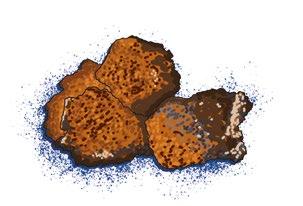
I was most interested in your feature “The Healing Power Of Medicinal Mushrooms”. I just used to think of them simply as food, but I realise now, they’re much more than that and not quite the common mushroom
I find as a topping on my pizza. Who’d have thought there is a whole lot more to appreciate about fungi?
I noted chaga was used as a coffee substitute during the Second World War when beans weren’t available, but that these days it can combat signs of ageing, lower cholesterol and slow the growth of cancer cells. There is a lot more to mushrooms than I previously thought. I also think it’s great that it is a vegetable, so no animal is harmed for a medicinal purpose for humans.
LEE SEVILLE, Liverpool

A NEAR tragedy has led to an amazing new development in sleep technology. When Georgia Miles was recovering from a serious accident, her father Alexander looked around everywhere for a pillow that would keep her comfortable throughout the night. A er examining countless types, Alex, a furniture and domestic product designer, decided to engineer his own.
He made a breakthrough when he realised that all pillows spread out and atten down as the weight of the head rests on them. is attening progresses through the night, leaving the head and neck poorly supported – and sleep interrupted. is is why many people nd themselves half awake and ‘pillow-punching’ in the middle of the night, desperately trying to get comfortable.
e innovative model that Alex designed has internal ties that hold the lling in place, and pull the pillow in and up to cradle the head and neck. is provides extra comfort and support that lasts


“I can honestly say that your pillow has made the world of difference… and fully endorse your pillow as being quite unique in its ability to maintain support throughout the night.”
through the night and ensures that you get the most bene t from an undisturbed sleep.
One of Britain’s best loved actors, Rula Lenska, was su ciently impressed to respond: “It is rare that something advertised as unique and life changing turns out to be true!! I have a chronic back and neck situation and I can honestly say these pillows make a HUGE DIFFERENCE!!! Comfortable... supportive... and positively magical for my neck!! Congratulations! A pillow that makes a real di erence!!”
Made in Britain, the Gx pillow comes in a choice of two levels of support: Medium-So , which most people seem to prefer, or Medium-Firm for those who like a little more resistance. e pillow has already transformed the lives of thousands of people. So if you have spent a lifetime looking for the perfect pillow, your search may well be over!
INFORMATION: gxpillows/0800 316 2689
Orthopaedic Surgeon, Dr Deane Halfpenny





You too can sleep better! Many of us have bought pillows without finding the right one because most conventional pillows, whatever their filling, flatten throughout the night. This can lead to disturbed and broken sleep. The Gx Suspension Pillow is different. It keeps its shape and cradles the neck and head for an undisturbed night. The Gx Suspension Pillow will change the way you sleep so you wake refreshed, rejuvenated and ready for the day.
The pillow has evolved
With the Gx Suspension Pillow, the unique ‘double X’ internal ties resist the flattening by pulling the pillow in and up to give the extra comfort and support that so many of us are looking for. Rediscover a great night’s sleep.
OUR PROMISE TO YOU
Sleep on the Gx Pillow for 30 nights and if you are not completely satis ed, we’ll give you your money back*



















It is rare that something advertised as unique and life changing turns out to be true!! I have a chronic back and neck situation and I can honestly say these pillows make a huge difference!! Comfortable…supportive…and positively magical for my neck!! Congratulations! Many, many thanks
Please send me the following Gx Suspension Pillows
Medium-soft
2 Medium-soft
1 Medium-soft & 1 Medium-firm Medium-firm
2 Medium-firm (quantity) (quantity) (quantity) (quantity)
£4.95 delivery (any qty):
Please make cheques payable to Beautiful Sleep Ltd

 Photo:© Stefano Rave R a/ a lamy Stock
Photo:© Stefano Rave R a/ a lamy Stock
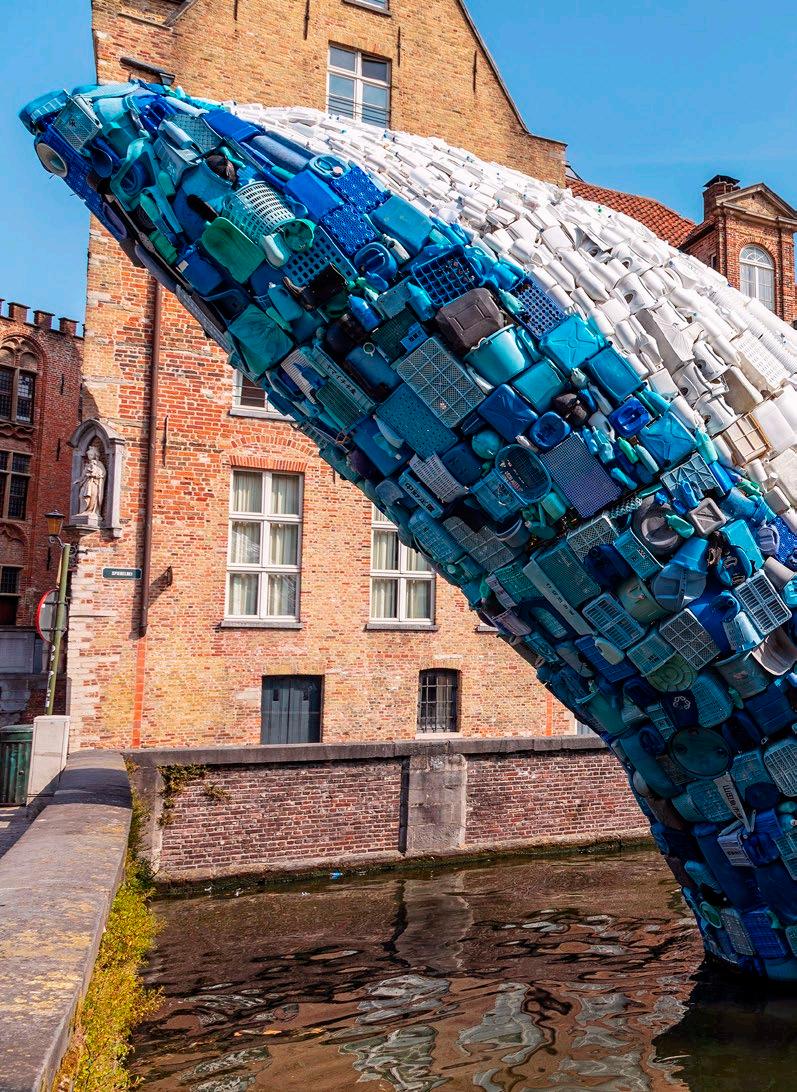 Photo:© f indlay/ a lamy Stock Photo
Photo:© f indlay/ a lamy Stock Photo

In 2018, visitors to the Belgian city of Bruges were met with the sight of a blue whale spiralling 36ft skywards out of a canal! Behind the project were the architects of StudioKCA, who had constructed this magnificent creature entirely out of plastic refuse. The whale’s old laundry baskets, hoses, buckets and spray bottles were fished from the ocean near the Hawaiian coast by architects Jason Klimoski and Lesley Chang to raise awareness about environmental pollution. Researchers believe that there are currently more than 150 million tons of plastic garbage choking up the world’s oceans. Sadly only five tons were needed to build this whale.
Amidst a return to so-called normality, Olly Mann finds that less choice really is more
So, "freedom" is here. Or, at least, coming into view. As fewer rules restrict our movements, our meals, our hugs and our holidays, we must revisit the perplexing questions that once formed our internal monologues. What do I fancy for dinner tonight? Shall I go to the movies? Do I greet my colleagues with a kiss, or a handshake?
The frustration of these decisions no longer being delegated to government health officials is that one must start choosing. Which overpriced coffee shop do I want to buy my latte from? What excuse can

Olly Mann presents Four Thought for BBC Radio 4, and the award-winning podcasts The Modern Mann and Answer Me This!
I use for getting out of that birthday party? Which newly-reopened soft-play centre is least likely to be crawling with germs?
As one of Thatcher’s children (generationally speaking; I’m not actually Maggie’s lovechild), I was brought up to believe that freedom and choice are somehow inextricably linked (even if, as with privatised water-boards and train companies, the "choice" on offer is entirely illusory). But too much choice is dizzying. Look at how many competing postal services we now have—that’s of theoretical benefit to consumers; but, as a citizen who just wants to send a parcel occasionally, it’s confusing to decipher which one to use.
It’s also time-consuming. That hour I spend each year choosing a new energy company (because I know I’ll be financially punished for
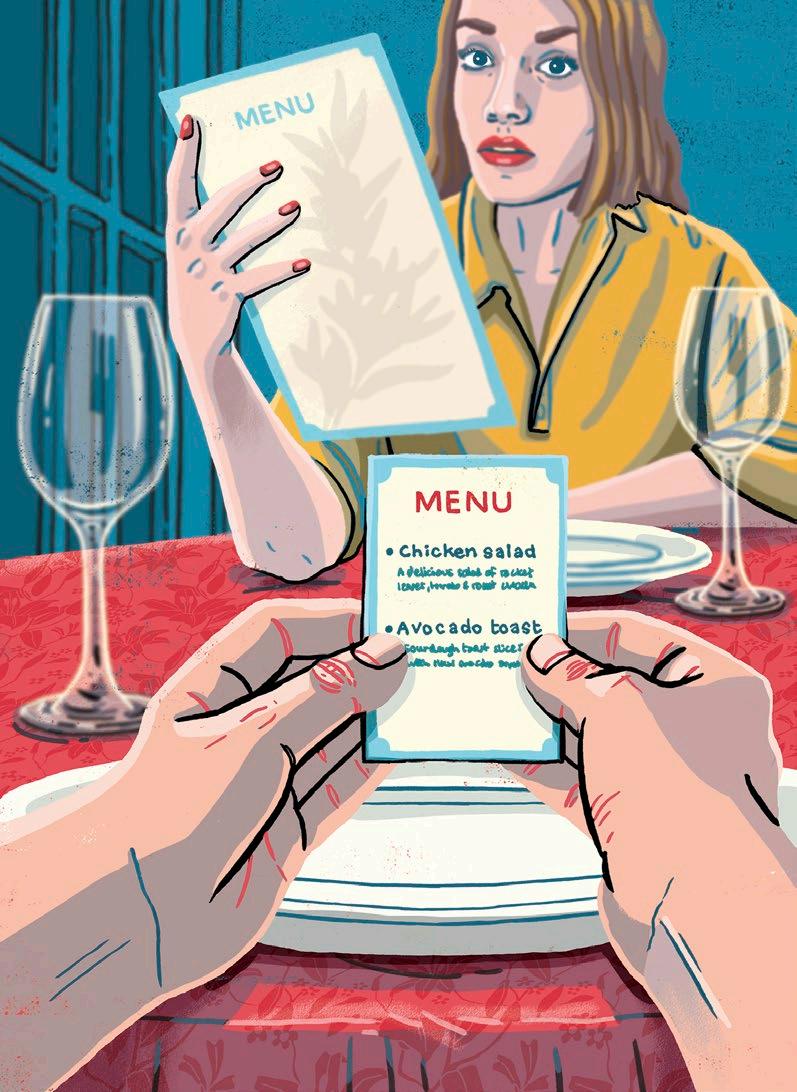
simply renewing my contract with my existing provider) is not a fun hour. It’s an obligation. Spending my "free time" choosing stuff doesn’t always feel particularly freeing.

I suppose this is the appeal of organised holidays. You know the kind of thing: "Day Five: Niagara Falls", "Day Seven: the drums of New Orleans". I used to find the idea of having some Sergeant Major figure diarise an itinerary for me completely repellent—it’s supposed to be time OFF! But now I understand why people opt for these vacations. Letting someone else do the choosing can be more relaxing than having to choose yourself.
Intrigued by this paradox—the less choice I have, the freer I sometimes feel—I’ve been conducting a thought experiment. I’ve been deliberately restricting the choices I allow myself to have. For example, when presented with a four-page menu in a restaurant… I’ll only allow myself to consider the first few options on each page. I know, it sounds nuts. But it’s actually quite liberating. I used to spend the first ten minutes of every evening out being irritated that I couldn’t properly sit back and talk to my dining companion because I hadn’t properly perused
the menu (while being simultaneously annoyed that I couldn’t properly read the menu because I was attempting to engage with my friend). These days, I just glance down, quickly select the best-sounding options from my self-imposed set menu, and get on with chatting and eating.
In so doing, I find myself trying new things. The other night, for instance, I ordered a smoked chicken salad as a starter. This would NEVER have happened had I permitted myself to glance further down the list, whereupon I would have spotted the avocado and crayfish cocktail; a sure winner. But guess what? The chicken salad was delicious. And although I’m sure the crayfish cocktail would have been wonderful too, that would have been less surprising, because I would have been expecting to enjoy it. So, far from curtailing my freedoms, restricting my choices can sometimes lead me to a wider range of experiences.
The same applies to home entertainment. I’m generally happy to live in a world of on-demand media, but still readily identify with Bruce Springsteen’s song, “57 Channels and Nothin’ On”. And he
wrote that in 1992! I can now access THOUSANDS of films and TV series from my remote control; yet, despite this, after ten minutes of scrolling through apps and menus, I will more often than not find myself watching whatever Channel 4 happened to have scheduled at 9pm. So, now I’m deliberately restricting my choices. Before I even turn on the TV, I ask myself: What do I want to watch? I think of a programme. And I turn it on. I don’t get distracted by other choices being flung my way. I just watch the thing I intended to.
This monk-like devotion to a simpler set of possibilities came in handy when our summer holiday to Lanzarote was COVID-cancelled (for a second year running). I didn’t fret. I didn’t start scanning a million
TripAdvisor reviews for the best staycation substitutes, or compile a giant spreadsheet of potential alternative accommodations.
I simply went on Airbnb, entered our requirements, saw what properties in England were still available for the week we had booked off work (there were three, in the whole country), and immediately reserved the one I could afford (a farmhouse in Suffolk. Not quite Playa Blanca, but hey—it has a hot tub). In so doing, I saved myself days of anxiety, wondering if I’d made the right choice. As I hadn’t allowed myself to look elsewhere, there was no choice. And now I can actually focus on enjoying our holiday.
At least, that’s how I’m choosing to see it. n
Quiz: Is your Euros knowledge coming home?
1) How many countries qualified for Euro 2020 for the first time in history?
2) Who is the smallest country in UEFA?
3) Which famous Irishman is featured on the Euro 2020 official song?
4) Who is the only nation to win two Euros back to back?
5) How many host cities held Euro 2020 games?
6) What year was the first European Championship held?
7) Who was the first ever winner of the Euros?
The lively legend of stage and screen, Sir Derek Jacobi, opens up about the beginnigs of his career, the meaninglessness of awards and meeting his nowhusband, Richard Clifford
Sir Derek Jacobi is feeling a bit chipper. After a terrible year which has devastated the entertainment industry, things are looking up. Lockdown has now ended, venues are reopening and Derek is itching to get back to normal. “I cannot wait to go to the theatre and have dinner with friends afterwards. I cannot wait”, says the scion of stage and screen. At nearly 83, he has already been offered a film role, shooting this July. “I think it would be silly to say no after all this time”.
Softly spoken, charming, with a dapper sense of dress, Derek has
been acting royalty for decades. He had already forged an illustrious reputation in the theatre before he shot to fame playing the stuttering, reluctant Roman emperor in the TV series I, Claudius for the BBC in 1976. Despite skimpy sets and a low budget, it was an unlikely hit and kept the nation entranced. “Having hardly done any telly, I was suddenly being fed into people’s homes twice a month [in the TV series].” The role and his performance poured rocket fuel on an already sparkling career.
“Within two years of I, Claudius, I was starring on Broadway, that’s the kind of game-changer it was.


Every actor wants a few peaks like that; I have had a couple of big ones [Hamlet, Cyrano de Bergerac], but the really big one was I, Claudius.”
Big stars as diverse as Charlton Heston and Ronnie Barker had been mooted for the title role and Derek, then a relatively unknown actor, was low on the list of contenders. However, hungry for the part, he produced one of his best performances ever—off-screen “at an Italian restaurant in Shepherd’s Bush, when I had to charm the arse off the US producer who was making I, Claudius for the BBC. We finished up the meal and they gave me the part.” Derek went on to play a gamut of screen roles from the medieval monk Cadfael in the eponymous TV
series, to co-worker Mr Wheen in the children’s film Nanny McPhee.
His work on stage, particularly in classical roles (he has played Hamlet over 400 times, the first occasion was when he was still at school), is equally renowned. His performances in Peer Gynt, King Lear and Uncle Vanya are legendary. He was a founding member of the National Theatre (in 1962) having been invited to join the new company by Sir Laurence Olivier. “That company was gold dust”, says Derek. “Laurence Olivier directed me and I got to work with John Gielgud, Paul Scofield, Maggie Smith, Albert Finney, and Bob [Robert] Stephens. I was fresh from The Birmingham Repertory

“THE ONLY GOOD THING ABOUT CRITICS IS THAT THEY ENHANCE YOUR REPUTATION”
Theatre and suddenly in the company of people who were huge outside the theatre: film stars and knights of the realm.”
It wasn’t long however, before Derek was earning equal recognition and as his career progressed, a Bafta, a Tony and numerous other theatre acting awards, all followed— although speaking to him, you would never know it: he comes across as unfailingly modest. “Acting awards are a bit hit and miss really; do you know what I mean? It’s in the eye of the beholder. I have never really been easy with critics and for someone to
say, ‘OK you are best actor this year, for this part’—well, I just find it all a bit strange. The only good thing is that it enhances your reputation and possibly you get more work.”
Two accolades which do mean a lot to him, are his knighthoods: one Danish and the other British. The only other actor to be similarly awarded was Laurence Olivier: “So I am very proud of those”, he says. The British award was particularly fun. “I was sent a letter, saying I was being considered for a knighthood. Would I like one? There is a little box to tick ‘yes’ and a little box to tick

‘no’. I wonder who ticks ‘no’?” he asks mischievously.
It is all a far cry from the workingclass world of East London where he grew up. His father ran a sweet shop and his mother was a secretary in a drapery store. Derek was a doted-upon only child. A grammar school boy, Derek won a scholarship to Cambridge to read history. His contemporaries included theatre director Trevor Nunn and Ian McKellen who had a crush on him: “A passion that was undeclared and unrequited”, as McKellen relates it. His performance of Edward II at the university led to him being
invited to join The Birmingham Repertory Theatre after graduating in 1960. And even though an acting career was as unlikely as flying to the moon for someone from his background, his parents were always very supportive. “ ‘If you want to do it son, you do it,’ my dad would say. But Shakespeare was way, way, beyond anything they knew. When I was at the National it didn’t mean anything; then, when I was in I, Claudius, [and on television] they could see it and my mum could talk to all the neighbours because they knew about me. I owe them a great deal,” says Derek.
He lives with theatre director,

Richard Clifford, in West Hampstead, London. Richard first approached him after a play, saying he was a fan. Derek was in his forties, living alone and Richard was 17 years his junior. They have been together over 43 years. Their age difference “has not been a problem so far”. The secret to their successful relationship is, Derek says, that “we are friends. We have gifts to give each other”. Did they ever want to adopt or have surrogate children? “No. I like other people’s children and I have several godchildren but no, I don’t want my own. At the end of the day, I like to put them in the cupboard… away”, he says. They entered into a civil partnership in 2007 and were married three years ago on Derek’s
“I LIKE OTHER PEOPLE’S CHILDREN BUT I DON’T WANT MY OWN—I LIKE TO PUT THEM AWAY IN THE CUPBOARD AT THE END OF THE DAY”
80th birthday. The couple have spent much of lockdown reading (Where the Crawdads Sing by Delia Owens, Napoleon by Adam Zamoyski and Mr Cadmus by Peter Ackroyd, were all favourites), gardening and walking with their beloved Irish terrier, Daisy. “She makes people smile, she has a lovely nature. And they are a doggy size; they are not small and not huge they are just the right size,” he says.
Inevitably, despite the constrained times, Derek was called on for the occasional role. Under lockdown he was the Narrator in a filmed theatre production of Romeo & Juliet and he also narrated the audiobook of Captain Sir Tom Moore’s biography. “We have a house in France and some of the recordings involved sitting in a wardrobe with duvets”.
Once back home in West Hampstead, things were easier. “My other half has very cleverly fitted up a recording studio at the end of the garden—it’s very good. There is no need for a taxi or the tube. I just walk to the end of the garden.”
“MY BACKGROUND IS ORDINARY EAST LONDON, SO IT WAS RATHER LOVELY TO DO A JOE BLOGGS CHARACTER”
Life then, is generally good. However, it hasn’t all been plain sailing. In 2014 he had prostrate cancer, [he’s now in remission] and then later the same year, a bad fall while on holiday in the Maldives. “I ruptured [the tendons in both] knees. When I did it, I thought, This is paraplegic; this is wheelchair.” He had to spend eight weeks in hospital but “Fortunately, I fully recovered.” And Richard was there of course to help him. “I am finding the older I get, the more I get, in a way, reliant on him. I am coming up on 83 so little bits are dropping off. I dedicated January 2021 to maintenance… my back, teeth, eyes… all that carry on”. Not that Derek allows old age too slow him down too much.
Prior to lockdown, he was working on Last Tango in Halifax, the BBC series which finished its fifth run in early 2020. Derek plays patient, decent, Alan Buttershaw who marries his childhood sweetheart, the rather bossy Celia played by Anne Reid. Working class “Alan”, tapped into
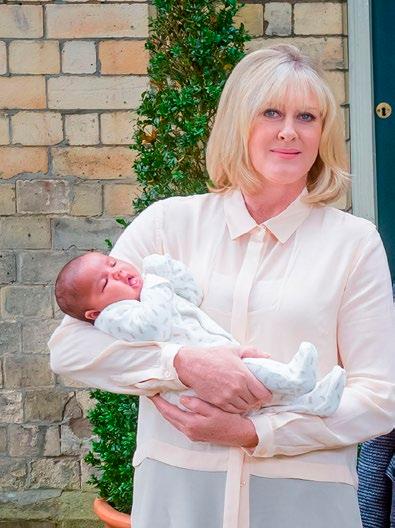
a part of Derek which he has not normally played.
“Whatever acting reputation I’ve got, is for rather posh, classical theatre, costumes and lots of wigs,” he says. “But the lovely casting director of Last Tango in Halifax said, ‘Let’s give Derek something ordinary’. And that is, in fact, my background: ordinary East London. It was rather lovely to do a Joe Bloggs character.” Originally the show was about love at any age and it has proven to be a huge hit. One critic summed it up as a “triumph against TV’s ageism”— much to Derek’s delight. “I don’t
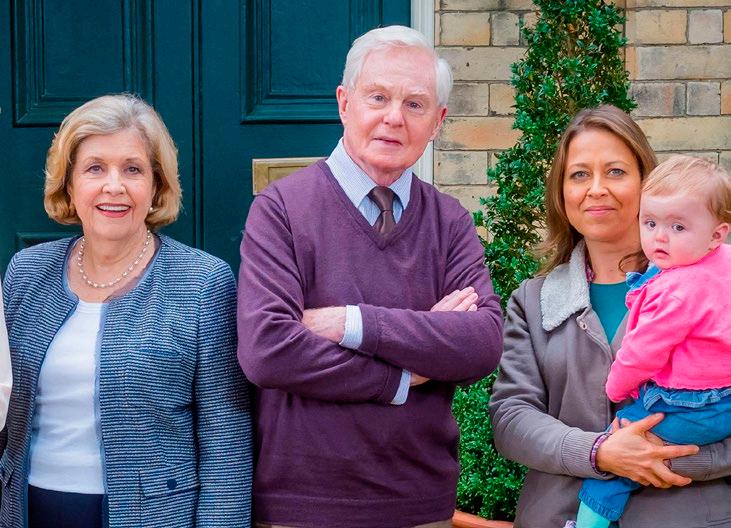
feel my age, thank goodness. The entertainment industry is one of the professions that if everything is working, you can carry on.”
So much so, that Derek and Anne ended up making a debut album together: You Are The Best Thing That Ever Happened to Me, a collection of duets from The Great American Songbook. “Anne does cabaret here and has done it in the US and there was one episode (in Last Tango) where I serenaded her. She said, ‘I didn’t know you could sing. Let’s make a record!’ And so we did. And I loved it, I just loved it” he says.
So does he ever get tired of the world of work? “I heard a phrase apparently used by Clint Eastwood. He was asked how he coped with old age and all the rigours of a film studio. Apparently, Eastwood said, ‘I don’t let the old man in’, which is my watchword,” says Derek. And without doubt it is. n
The album You Are The Best Thing That Ever Happened to Me—Duets from The Great American Song Book by Derek Jacobi and Anne Reid is available from HMV online at £9.99
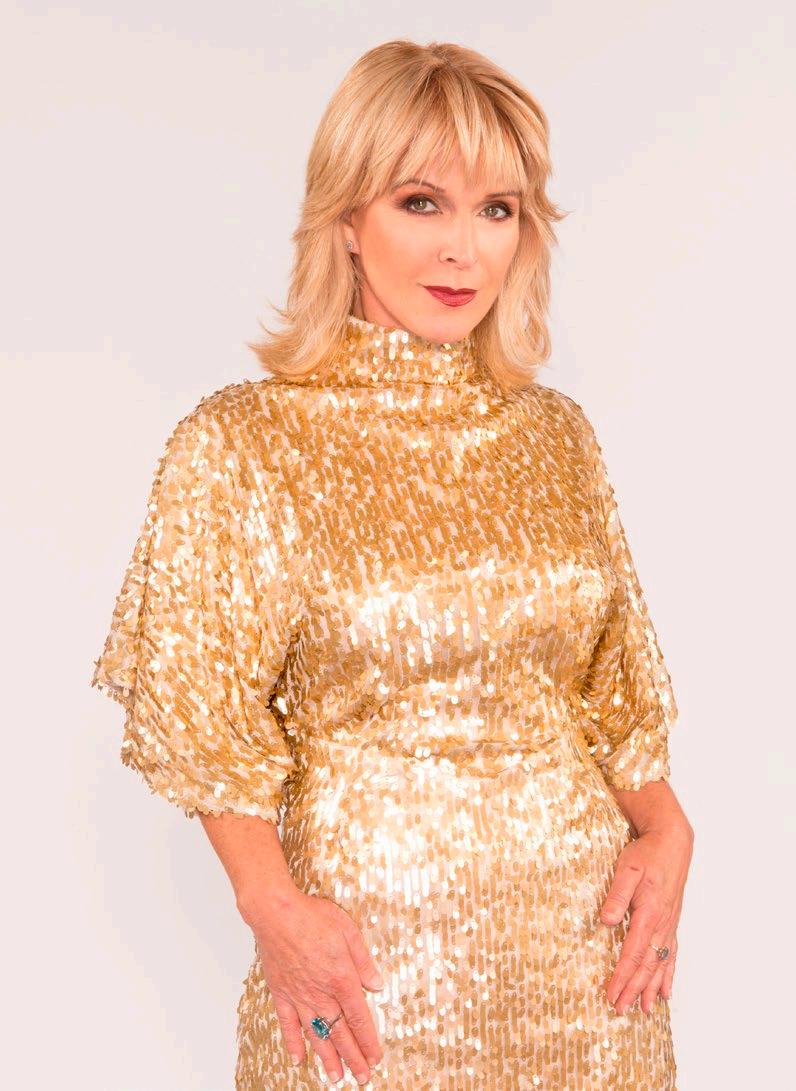


Toyah Willcox (63) is an English musician, actress and TV presenter. From fronting a band to releasing solo music, there is little that she hasn't done across a four-decade career
MY CHILDHOOD WAS DEFINITELY PRIVILEGED. We always had hot water, heating, food, we had our own home, and I went to a private school.
HAVING A LIMP, DYSLEXIA AND ALSO A LISP. I wasn't even aware of it. I was having a perfectly happy childhood until people pointed out that I had a physical difference to everyone else in the room. Then,
when I was sitting my 11-plus exam, people realised that I was not on the same page as everyone else because of my dyslexia. Alan Sugar, Richard Branson—you could name a thousand people who have exactly the same experience as me and we're doing perfectly well. I have such a wonderful life and I have overcome so much.
I wouldn't say that that specifically made me tougher. What made me

tougher was being the only woman in the music industry. My way of learning, my way of working, means that I have to just be a little bit ahead of everyone else. And I think any woman in acting or music would say, "I feel the same too."
You never just arrive.
HAVING A UNIQUE NAME. My mother, who was a dancer and on the road touring from the age of 12 till she was 18, was keenly aware that she wanted to be different. She wanted to be an artist. She wanted to go to Hollywood. I was her third child, and I got that name. My mother says she read it in a
children's book. It was the name of a ballerina. It was wonderful. My name made people remember me.
THE NAME BECOMING FAMOUS. Everywhere I've had success, from Australia to Africa right through to LA, there are now Toyahs. You kind of permeate the culture. The Toyah [Battersby] character in Coronation Street was a really lovely character and they had my blessing for that.
THE BATTERSBYS BEING LAUGHABLE "CHAVS". I don't judge people like that. No matter what money they have in the bank, people just crave individuality and
Toyah in 1979 (Right); Shooting the video for Brave New World in 1982
for some people it's through names. These were good, honourable, saltof-the-earth people.
I WAS DRIVEN TO BE AN ACTRESS. That's what I felt I was supposed to be doing. The way an artist picks up a paintbrush and feels at home, I wanted to act and sing. I was very, very passionate about both singing and acting.
THE MOMENT I LEFT HOME, I BECAME THE TOYAH WHO I FELT I SHOULD BE. I had such a closeted education that was exclusively female that when I went out into the world, I didn't know the things
I needed to know. I was never taught how to get an electricity account, or phone account or how to buy a train ticket. I found myself at the age of 18 as the youngest member of the National Theatre. I remember [actors] Brenda Blethyn, Kate Nelligan, Warren Clarke all helping me find my feet in London. And when I found myself with other artists, who were very free thinking, and very bohemian, I found myself being an observer.
BEING TALKED DOWN FROM A BRIDGE BY A POLICEMAN SUSPECTING A SUICIDE BID. I'm often contacted by people who
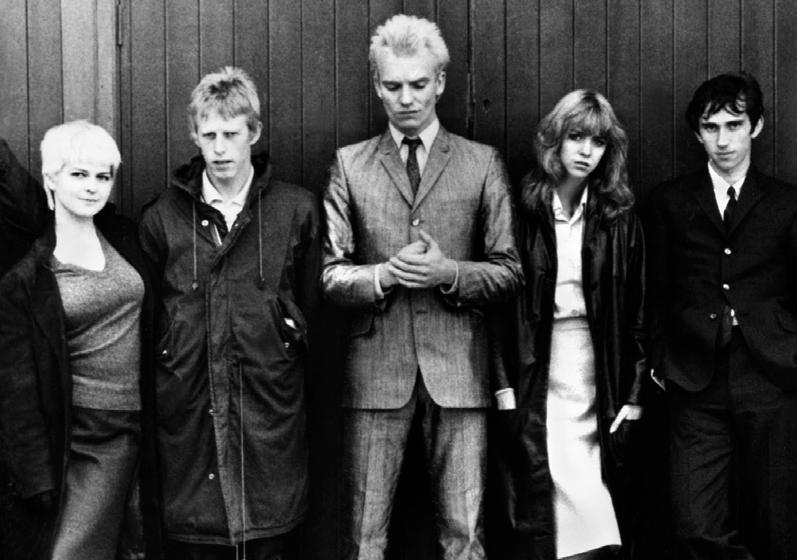
are so low they don't know what to do. I can talk them back. I totally realise as a 63-year-old woman that time is a gift and even when events are challenging, they are a gift to help us see the opportunity that they're presenting. I have no need to look back to that girl on the bridge because since then I've had 40 years of experience.
HAVING PARALLEL SUCCESS AS AN ACTOR AND SINGER. I got spotted on the streets of Birmingham because I had dyed hair—I was a hair model— and there were two directors called the Bicat brothers who were looking for an exceptional
young girl for a half-hour play on BBC Two called Glitter.
There was a very clear division between actors who did voiceovers, actors who did TV and actors who did stage. The actors that did stage were considered royalty. I just couldn't see the sense of that. I did voiceovers, I did TV; I did absolutely everything. And I had a band as well. It's just that the acting happened to take off before my band. I formed the band immediately when I moved to London because the National Theatre is one of those creative hubs where you can just literally find anyone that you might need for a creative project.

SUCCESSIVELY OBTAINING PARTS IN FILM QUADROPHENIA AND TV SERIES QUATERMASS AND BEING SIGNED TO A RECORD LABEL. It's what I expected. I really believe in myself and back then I believed in myself even more. Now, I think that's unrealistic. I had an extraordinary run of luck but I deserved it—that was my attitude.
There was a revolution at the time with synthesisers, and people were experimenting with sound. Blue Meaning doesn't stand out as punk or Birmingham rock—I'm a Birmingham girl—because we were
genuinely fighting for something unique. Many critics have picked up on this as the embryonic beginnings of the Gothic movement. It's not been available for 40 years, but people can get hold of it again. This has been a driving force for me: to get this music back where it deserves to be in the historical place it belongs within music. There's no resting on laurels till I've done that.
My really big commercial hits started around March 1981 and it was so evident that I was like no other artist who'd been before. I was completely


attached to imagery. This wasn't linked with fashion. The hair and images that we created at that time could not be copied at home. We had to use specialist hairsprays that set everything solid, the makeup wasn't available on the high street, so what I was creating was unique. Also, it was slightly third gender in that I wasn't a glamour model, I wasn't exposing my body. It was otherworldly. Women just weren't behaving like that then.
MARRYING ROBERT FRIPP OF KING CRIMSON. When we first met, our careers were culturally very wide apart. He's the creator of prog rock and I was a kind of new wave pop-
rock artist. I'd love being photographed, while he would walk away from the photographer. We were just complete opposites.
Apparently, when he met me three years earlier, he said to his friends, "I think I've met my wife." We didn't do the vows of ownership. We had those taken out. I never, ever had any urge to have children.
The most extraordinary thing about lockdown for us, is the fact that it's longest time we've ever had together uninterrupted. We've absolutely loved being together. We've become incredibly creative. We've created a worldwide audience through making Toyah TV.
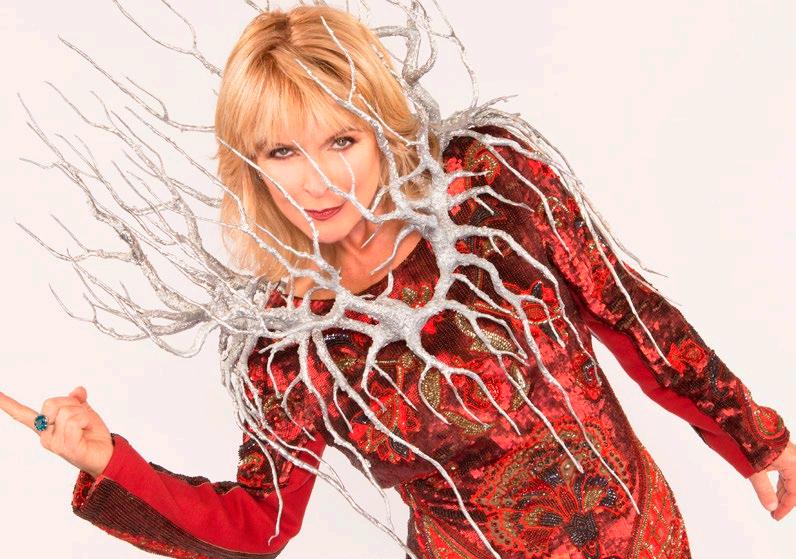
RECORDING NEW ALBUM POSH POP WHILE SIMULTANEOUSLY OVERSEEING THE RE-RELEASE OF THE BLUE MEANING .
My lockdown was exceptional in that I made the album. I made and directed ten videos in lockdown. It was very expensive. We had nurses come to the house to test us. The person I was on Blue Meaning was still having to learn a lot about the world, was thrown into this chaotic world of success. It was an extraordinary time. I look on myself with complete admiration for the strength I had at that time. [On] Posh Pop , I'm a completely different human being. I have the wisdom of
40 years of writing, acting, and creative experience. I'm much, much more grounded now than I was before.
The only connection I can feel between me now and the girl that did Blue Meaning is respect and admiration for her. It's honestly like looking on a daughter. n
As told to Sean Egan
The Blue Meaning Expanded Deluxe Edition is out now through Cherry Red Records
Posh Pop is out now through Demon Music

Heart disease is a real risk for women yet its threat remains under the radar
by Victoria Goldman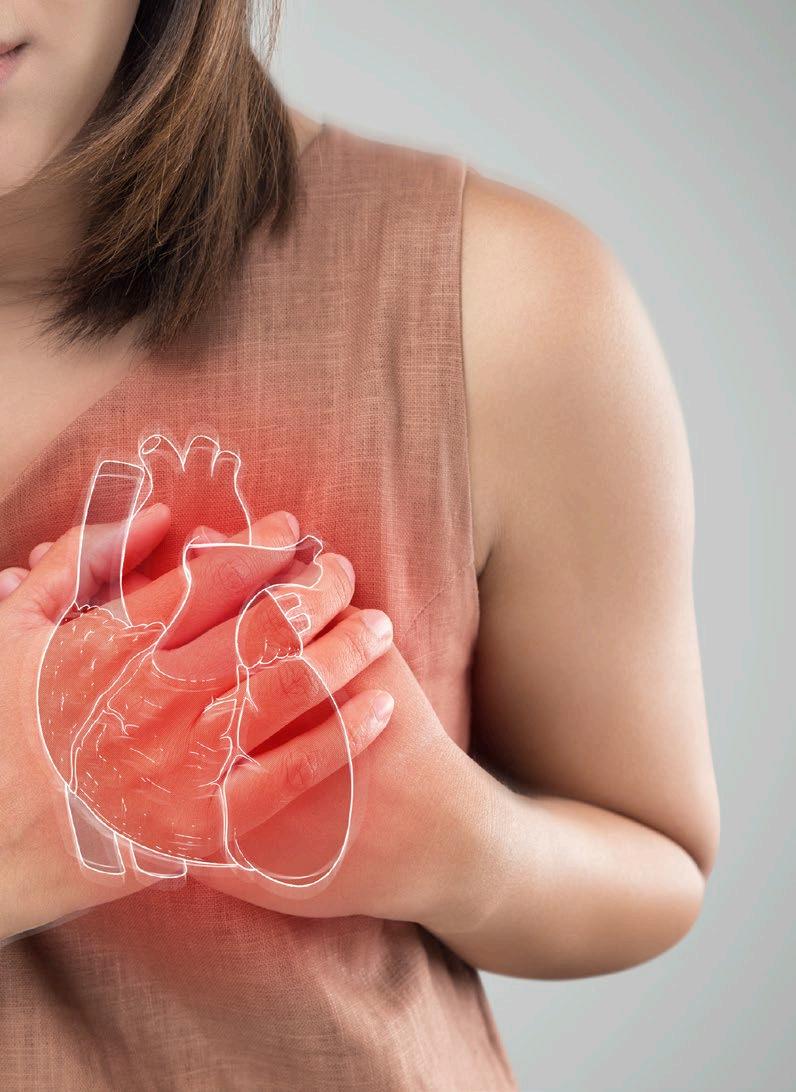
You may go for your routine cervical smears and mammograms but do you think about your heart health too? Coronary heart disease kills twice as many women in the UK as breast cancer, and it’s the single biggest killer of women worldwide. Yet it’s often considered to be a man’s problem.
According to a British Heart Foundation (BHF) report in October 2019, an average of 65 women die from coronary heart disease each day in the UK, most commonly due to a heart attack. Women don’t always realise they have a higher risk of heart disease, don’t always recognise the signs of a heart attack and often delay getting help. This is costing women’s lives.
You can’t change some of your risk factors, such as your family history or ethnic background. But it’s good to be aware of them. If you have African or African Caribbean heritage, for example, you may be more prone to having high blood pressure, which can lead to a heart attack or stroke. And there’s some evidence that the risk of having heart disease is up to
50 per cent higher in South Asians (who are more likely to store excess fat around their waistline) compared to white Europeans.
“If you have heart disease in your family, consult your GP, who can advise on ways to reduce your risk of developing the condition through a healthy, balanced lifestyle,” says Dr Brian Clapp, consultant cardiologist for The Cardiac Clinic at London Bridge Hospital (part of HCE UK).
“It is better to be aware of any inherited conditions as early as possible to better prevent problems occurring later in life.”
To raise awareness of this terrible condition, here are five heart disease risk factors that are either specific to women or may affect women more than men…
Before the menopause, your oestrogen levels should help to keep your risk of heart disease low. But when you reach the menopause (around the age of 51), your risk of heart disease may rise. According to recent US research published in the EuropeanHeartJournal in March 2021, women’s blood pressure and "bad" LDL-cholesterol levels often increase at the menopause, which may increase the risk of a heart
(containing oestradiol) have a lower future risk of developing heart disease and heart attacks. They often find their cholesterol lowers and their blood pressure reduces. Young women who have had an early menopause or premature ovarian insufficiency have lower oestradiol levels for longer, and have a higher risk of heart disease than women who experience the menopause at an older age.”
When you reach the menopause (around the age of 51), your risk of heart disease may rise
attack. Autoimmune conditions (caused by an overactive immune system), such as thyroid problems, are more common in women than in men, and may make you more likely to have heart disease too.
“The female hormone oestradiol has a very protective effect on blood vessels and the heart,” says Dr Louise Newson, leading menopause specialist and founder of balanceapp.com which offers free menopausal support for women.
“The risk of a heart attack in a menopausal woman is five times greater than the risk before her menopause. Women who take the right dose and type of HRT
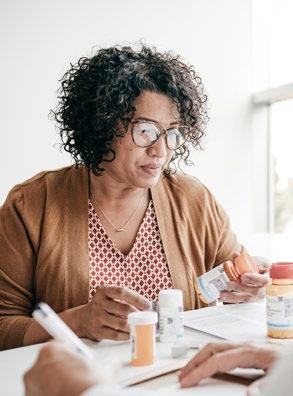
According to the BHF, smoking increases a woman’s risk of having a heart attack up to twice as much as a man’s. Giving up smoking is the single best thing you can do for your heart health.
“Smoking cigarettes makes the walls of your arteries sticky from the chemicals, so fatty material can stick to them,” says Julie Ward, senior cardiac nurse at the BHF. “If the arteries that carry blood to your heart get damaged and clogged, it can lead to a heart attack. If this happens in the arteries that carry blood to your brain, it can lead to a stroke. If you want to quit, get in touch with your local stop smoking services. You can also ask your doctor or pharmacist about nicotine replacement therapy (NRT)
or medicines that can help you quit.”
The two-year Vesuvius study from the University of Dundee, published in November 2019 and funded by the BHF, suggests that vaping may be less harmful to your blood vessels than smoking cigarettes. “Women benefitted more than men in every subgroup we looked at when they switched from tobacco cigarettes to electronic cigarettes,” says Professor Jacob George, professor of cardiovascular medicine and therapeutics at Dundee and chief investigator of the trial. “We are still trying to understand why this is the case, but we do know that women who smoke suffer ill-health in terms of cancer and cardiovascular disease disproportionately more than men.”

Research published in the British MedicalJournal in 2018, by researchers at The George Institute for Global Health, University of Oxford, revealed that high blood pressure is more strongly associated with heart attacks in women than in men, though the reasons for this are still unclear. In August 2020, researchers at Queen Mary University of London, University of Barcelona and University of
symptoms,” says Katharine Jenner, CEO of Blood Pressure UK, “yet it causes 60 per cent of strokes and 40 per cent of heart attacks. Lifestyle factors, such as eating too much salt and not exercising enough, play a big part in raising your blood pressure. This means that most people can do something about their high blood pressure to bring it under control, and that’s why knowing your numbers is key.”
Southampton found that women’s heart muscle tends to be finer and smaller than men’s—more research is now needed to see how this could affect women’s heart health.
According to Blood Pressure UK, 6 million people in the UK have high blood pressure and don’t know it. Yet every adult should know their blood pressure numbers in the same way they know their height and weight. An ideal blood pressure reading is between 90/60mmHg (millimetres of mercury) and 120/80mmHg. You have high blood pressure if your readings are consistently above 140/90mmHg.
“Dubbed the silent killer, high blood pressure rarely has

Heart and circulatory conditions remain the biggest causes of deaths in pregnancy or childbirth in the UK. Women are most at risk of heart problems during or after pregnancy if they already have a heart condition. But according to the American Heart Association in March 2021, women who experience certain pregnancyrelated problems, such as preeclampsia, pregnancy diabetes or miscarriage, may be more likely to have heart disease, heart attacks and strokes in later life.
Professor David Williams, consultant obstetric physician at The Harley Street Centre for Women in London, says the heart has to work 50 per cent harder and 20 per cent quicker during pregnancy. “It pumps out more blood with each heartbeat,” he says. “Women who become pregnant with a damaged heart that can’t meet the physiological demands of pregnancy can go into heart failure as pregnancy progresses. Women who develop high blood pressure in pregnancy, in particular pre-
eclampsia, are cured in the shortterm by childbirth. But they are at risk of developing high blood pressure in later life, and have a double risk of developing heart disease and heart attacks.”

Women are most at risk of heart problems during or after pregnancy if they already have a heart condition
Around 11,000 heart and circulatory deaths are caused by air pollution every year in the UK. BHF research has found that tiny toxic particles, called PM2.5, can damage the heart and blood vessels. Polluted air can come from several sources, such as domestic wood burning and cars, especially diesel exhaust fumes, as well as industry.
Dr Mark R Miller, research fellow at the Centre for Cardiovascular Science at the University of Edinburgh, says that women may be more sensitive than men to air pollution’s harmful effects. “This is especially the case in many developing nations,” he says, “where women are traditionally the homekeepers and are exposed to higher levels of pollutants from cooking and household heating using unclean fuels. The situation is less clear in Westernised nations such as the USA,

Europe and the UK where some studies, but not all, find the deaths linked to air pollution to be greater in men. This may partially be due to there being higher levels of heart disease in men compared to women.”
According to the BHF, eating a healthy, balanced diet with plenty of fruit and vegetables may help to protect you from the negative impact of air pollution. Julie Ward says it’s also a good idea to check the air pollution levels in your area before you exercise. “Avoid highly polluted areas, particularly if you have an existing health condition,” she says. “This includes roads with busy traffic, or places where air pollution is generated by industry, such as near factories. Some people choose to wear a mask to protect against the effects of air pollution but there is little evidence to say if this is effective.”

Building strength helps you stay healthy as well as fit
1. Use it or lose it
We start to lose muscle mass from the age of 30, but it’s never too late to improve it. If you do, it can help with your balance, reduce your risk of falls, increase bone density (which will help guard against osteoporosis), and benefit heart health too. Another plus is that you’ll look more toned and feel more confident.
2. Have a plan
If you’ve had previous health problems or injuries, you can tailor your strength training—aka weight or resistance training—to your own needs. Book in a session with a physio or a personal trainer so that you can be assessed and get a personalised plan.
3. Start small
Don’t go crazy—you’ll end up doing yourself a damage. There’s
no need to go to the gym and lift dumbbells or kettlebells if that’s not your thing. Resistance bands— stretchy elastic strips—are just as good. In fact, they may make you less prone to injury. They come in different tension levels. You can even use your own body weight to build strength. There are plenty of free beginners’ workouts on YouTube and on the NHS website. Don’t forget to have rest days to allow your body to recover.
4. Set a goal
What do you want to achieve? Do you want to lose a few kilos, get fitter, look more toned, or improve muscle mass for health purposes? Or maybe it’s all of those. To lose weight, do more cardiovascular exercise, such as brisk walking, cycling or running. For example, do three days of cardio and two days of strength training. If you’re looking principally to tone up and build strength, do more resistance training than cardio. Or if you simply want to improve muscle mass, experts recommend doing activities that improve strength, balance and flexibility on at least two days a week.
5. Work out what to work on Make sure you build in lower body exercises, as your legs support the rest of you. Focus on glutes (your bum), quads (muscles at the front of
your thighs) and hamstrings (tendons at the back of your thighs) by doing regular squats and lunges. Having a strong core is essential, as this helps stability, balance and your back. To strengthen it, do isometric exercises such as planks and side planks.
6. Pack the protein
Building strength isn’t all about getting physical. You need to eat well too. Protein is key. Include it in all your meals in the form of lean meat, fish, beans, tofu, eggs or dairy produce. Focus on mixing protein and carbs, such as fruit, rice, sweet potato and quinoa, as these will help with muscle growth.
7. Be sociable
Exercising with others will help you stay motivated and it’s always nice to be with like-minded people. Find yourself an exercise buddy, such as a friend or family member; do live Zoom classes or go to inreal-life gym classes. n
For more weekly health tips and stories, sign up to our newsletter at readersdigest.co.uk

We love the sun and we love laughing but, let’s face it, both are a shocker at showing up crow’s feet

from the kind of damage that can lead to skin cancer.
Sleeping on your face can exacerbate wrinkles. Try sleeping on your back or opting for the luxury of a silk pillowcase, which won’t pull on your skin or form creases that then etch themselves into your face. It also absorbs less moisture than other fabrics. And, of course, getting adequate sleep always makes you look younger and healthier, so try to get at least six hours a night.
The skin around our eyes is much thinner than on most of the rest of our body, so these fine lines are often one of the first signs we’re getting older. They develop when our bodies start to produce less collagen, which helps give our skin elasticity and firmness. Repeated use of the orbicularis oculi muscles from squeezing our eyes shut, smiling and squinting in bright sunlight is also a contributory factor. Some things we just can’t change, but one thing we can do is take care of the delicate tissue around the eyes. UV light doesn’t just make you screw up your eyes; it also ages the skin. So wear sunglasses in all seasons and weathers and dab a high SPF sun cream up to the eye area (but avoid the eyes—ouch!). These measures also help protect your skin
You can help yourself squint less by wearing glasses if you need to, ensuring the prescription is up to date and increasing the font size when you’re reading onscreen. Don’t read from a screen for long periods of time without a break.
Eye creams can help and some people swear by “face yoga”, though the jury’s still out. But why not give it a go? Place your middle fingers on the inner corners of your eyes, your index fingers by the outer corners, squint hard upwards, hold for 15 seconds and relax. Do this three times.
But please don’t stop laughing—we like you like that! n
Psychiatrist Dr Catherine Carney works at the Delamere addiction rehab clinic in Cheshire
How did you become an expert on addiction, including alcohol?
I went into medicine as a mature student and also did a psychology degree. I started in the NHS as a junior doctor but struggled with the hours as a single mum. Realising my favourite bit of medicine was psychiatry, I rang a rehab clinic in Altrincham off the cuff. Two days later I had a job mainly working in addiction with very experienced consultants.
What are the signs that your drinking is a problem?
Does it impact negatively on any area of your life, such as work or socialising? Is it the focus of your day? Have you put someone in danger by drunk driving or having unprotected sex? If it’s affecting your money, kids or relationships, or it stops you doing things like going for a morning run, then it’s a problem.
What can people do to cultivate a healthy relationship with alcohol?
Stick to the recommended 14 units but don’t drink them all in one day. Have two or three alcohol-free days in a week. There’s a lot of peer pressure,

so sometimes people have to adjust their socialising. Don’t drink to escape emotion, stress or boredom, or to sleep. Make alcohol a treat rather than a routine.
What can people do to cut back?
Consider having smaller or lowerstrength drinks, setting a budget or designating yourself as the driver. Try to surround yourself with people who aren’t drinking heavily.
When and how should someone seek help?
If you think you’re drinking too much and you have tried reducing it or stopping but can’t, that’s when it’s time to ask for help. Or if someone else mentions it.
If you’re physically dependent on drink, then you definitely need professional support. Start with your GP. Most areas also have a community drug or alcohol team and you can normally self-refer. Other options include Alcoholics, Drinkline, Adfam, SMART Recovery, Al-Anon and private rehab facilities. n
For more information, visit delamere.com
This month, Dr Max wonders how preoccupied we should be with our children’s TV habits
Isat staring, slack-jawed, unblinking. The mesmerising, soporific sounds from the television lapped over me. The toddler sitting on my lap was the same. It was intoxicating. This was like the visual equivalent of Valium. I hadn’t watched children’s television since I was a child so it was all quite a revelation for me that this is the sort of stuff that a generation of youngsters are being brought up on.

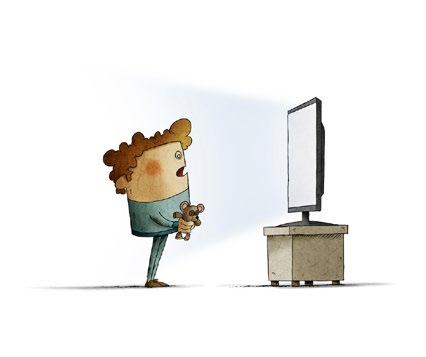
Max is a hospital doctor, author and columnist. He currently works full time in mental health for the NHS. His new book, The Marvellous Adventure of Being Human, is out now
Perhaps it’s a sign of my age, but I don’t remember children’s TV being quite as banal and inane as it seems to be now. What was interesting was the transformation that took place in my godson. He went from being his usual inquisitive, questioning, explorative self, to being a docile, mute toddler-shaped lump sitting on my lap the minute the programme began. This, I reasoned after the programme had finished, was the appeal of children’s television. It was precisely its ability to captivate
and pacify that made it so popular. If my godson was anything to go by, I could understand why households up and down the country resorted to using the television—and increasingly iPads—to give brief and welcome respite from the exhausting task of caring for toddlers. I’d only spent the afternoon with him but I needed the rest of the weekend to recover; I’d never be able to cope for more than a few hours. But equally, the television is limited in the stimulation it can offer a child. The interaction is totally passive; it mollifies and stupefies which, given that the brain of a toddler is developing at such a phenomenal rate, can’t be a good thing, I reasoned. As I watched my godson experiment with trying to smash the conservatory glass with my mobile phone I began to feel guilty that I’d let him down while he had been in my charge and I’d resorted to using the television to entertain him. If he doesn’t win a Nobel Prize before he’s 30, it will all be my fault , I thought as I wrestled my mobile phone from him.
will do badly at school. But actually, on reflection, I’d like to be the voice of calm.
IF HE DOESN’T WIN A NOBEL PRIZE BEFORE HE’S 30, IT WILL ALL BE MY FAULT
At medical school, we read studies in child development that showed that the more TV a toddler watches, the higher the likelihood that they
Children do not need stimulation all day, every day. There are lots of other factors that affect a child’s development. When I worked in child psychiatry, I came across truly deprived children. These are the kinds of children that are plonked in front of the TV for hours on end. To say that it’s the television to blame when these children fail to learn to read and write adequately is a simplification. When you’re put in front of the television to keep you quiet while your mum drinks a bottle of vodka, for example, the problem is not the television. The dominance of TV in their lives is just symptomatic of a wider problem with the parenting that they experience. Studies into the effects of TV show the importance of nurture on children’s development, but for the likes of my godson, who has an otherwise stimulating and loving environment, their parents shouldn’t berate themselves when they feel the need for a break in their day and use the television to help with this. Children need a rest as much as the parents do. And, of course, so too godparents. n
Q: Almost four years ago, I slipped on a patch of mud. I went completely over on my left ankle which folded beneath me and my body weight followed through, immediately swelling up. An A&E X-ray diagnosed no fracture and advised rest and raising foot above heart level, however, no improvement followed. Physio, Osteo, acupuncture, massage and further X-rays, MRIs and mobility clinic have not helped and NHS has discharged me. Any ideas please?
- Costas, 57A: By coincidence something similar happened to me and, just like you, it caused significant problems for a number of years with flare ups of stiffness, swelling and pain. It sounds like you’ve tried a lot of things already. It might be worth speaking to your GP again to double check that you’ve exhausted everything your local NHS can offer. You might also ask to be referred again to an orthopaedic surgeon for a second opinion as a fresh set of eyes might help. You should be able to ask for this on the NHS and even if there isn’t a surgical answer, they may
be able to explain why it’s still causing you problems and make some further suggestions about what might help. I wonder also if you have seen a podiatrist? These are healthcare professionals who specialise in feet, ankles and walking. I saw a specialist musculoskeletal podiatrist at the Institute of Sport Exercise and Health about my own injury and I found her to be incredibly helpful in looking at my gait which, it turned out, was what was causing the injury to still hurt. She made inserts to support the arches in my foot and advised on suitable shoes and it made a real difference.
Depending on what the problem actually is, you might also consider investigating PRP injections. This is quite a new treatment that involves taking a sample of your blood and extracting the platelets and injecting them directly into the problem area. The idea is that it uses the body’s natural healing properties to reduce pain, inflammation and improve joint functioning. n

Got a health question for our resident doctor? Email it confidentially to askdrmax@ readersdigest.co.uk
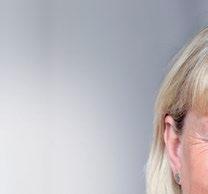















Pen and paper are powerful tools for learning, says our memory expert, Jonathan Hancock
My grandmother had a remarkable memory.
Lucy Goodman’s mind was a treasure trove of information. She loved sharing the things she’d experienced or learned, and she delighted in having all the fine details at her fingertips.
However, like a well-managed computer, her memory bank was also “backed up”. In her immaculate handwriting, in books, on scrap paper—even using pages from her beloved Reader’s Digest—she wrote notes that she could store, check, and pass on to others. Her intricate lists and plans made her ruthlessly efficient. She also recorded stories from her childhood to enthral family and friends. And she was always jotting down new things she’d come across that she thought might be useful to other people (especially me!). She was a fount of knowledge well into her tenth decade.
Recent research in Frontiers in Psychology has underlined the connection between writing and recall. It explains that handwriting is a multi-sensory act: the movement of your hand, the sounds and even the
smells of writing as the letters form before your eyes. It’s so much more engaging than just reading or hearing something—and significantly more effective than typing.
Handwriting switches us on for learning, connects different parts of our brain, and opens up new ways to be creative. It may feel like hard work at times, but the mental and physical effort is what helps us to engage with what we’re doing—and, ultimately, that’s why we remember more.
So find opportunities to access the memory-boosting power of writing:
• Jot down shopping lists, jobs to do, things you want to pass on, or ideas you don’t want to forget.
• Handwrite a brief diary entry every day, then see if you get better at recalling what you did after a day, a month, a year.
• Record some of your oldest memories for the next generation. You might be surprised at how much more you remember when you write your recollections by hand.
• Be creative. You can use different colours, organise the information to suit you, and even add symbols or doodles to boost your memory.
I strongly recommend that you also find reasons to write, every day. It’s a great way to organise and engage with information—old and new—and to keep your whole brain active and involved in learning.
I’m confident that Grandma Lucy would agree! n













With busy, demanding lifestyles, more of us are looking to support energy release and vitality with an iron supplement that is easy on the stomach and tastes great too!
Feroglobin ® Liquid , gentle iron that supports normal formation of red blood cells and haemoglobin and normal energy release in a honey and orange flavour liquid.









Feroglobin® Fizz, iron and supporting nutrients in an effervescent formula that makes a refreshing, natural orange flavoured drink. It is ideal for those who prefer an alternative to capsules
With iron, folate, vit.B12 which support the reduction of tiredness & fatigue




Feroglobin ® Liquid and Fizz are both suitable for vegetarians
*Source: Nielsen GB ScanTrack Total Coverage UNIT Retail Sales 52 w/e 24 April 2021. To verify contact Vitabiotics Ltd, 1 Apsley Way, London NW2 7HF. From Superdrug, Holland & Barrett, supermarkets, chemists, health stores & www.vitabiotics.com


A popular diet trend works well for many weight watchers, and the benefits might extend beyond your waistline
Edited By Rozalynn S. FrazierLike many people who put on extra weight, Jerico C was surprised when it happened to him. A native New Yorker who loved walking around the city, he used to be able to eat whatever he wanted whenever he wanted and stay pretty thin. But then, well, life happened. A move to California meant more driving and less walking. His advertising sales job required company dinners and later nights. Two kids left little time to think about healthy eating, and get-togethers with his extended Filipino family meant lots of big meals. “When you welcome anyone into your home, it’s an automatic feast,” he says. Suddenly, Jerico turned 40 and found 199 pounds on his six-foot frame. “I had to do something different,” he says.
It was around that time that he came across a post on social media by a friend who had dropped about 60 pounds. How’d he do it? Jerico asked. IF, said the friend. “If? If what?” Jerico responded.
The answer was intermittent fasting (IF): fasting completely for discrete periods of time and eating anything you want otherwise. That can mean fasting for parts of a day, a day at a time, or two days a week. Jerico decided to try an 18:6 plan, which meant carving out a six-hour window—say, from noon until 6pm—when he could eat whatever he wanted and then going the next
18 hours with absolutely no food (but unlimited water, coffee, tea, and other noncaloric beverages). Two and a half years and 25 pounds later (give or take a few, thanks to the pandemic), Jerico hasn’t looked back. “I like it a lot,” he says. “It has made me realise that our appetite is more tied to seeing food than needing it. I do miss breakfast food, though. In fact, I regularly have breakfast for dinner.”
No one would say that intermittent fasting is easy, but it has many advantages. There’s no counting calories, resisting snacks, cutting out food groups, or other challenges that come with restrictive dieting. Instead of focusing on what you eat as dieters do on Paleo (no processed foods, grains, or sugar), Atkins (low carbs), Whole30 (no sugar, alcohol, grain, dairy, legumes), and other regimens, IF puts the emphasis on when you eat. “Rather than saying ‘Just eat less,’ we tell them not to eat after 6pm,” says Elisabetta Politi, RD, nutrition director for the Duke Diet and Fitness Centre. “For those who have the discipline, it works.”
No matter how long your fasting period, the metabolic impact on your body is similar. Typically, when we eat, our bodies break down the carbohydrates from the food and turn them into a form of sugar known as glucose, one of the body’s preferred fuels. Unused glucose is stored for
later in your liver. So if you are eating three meals a day, your body always has energy on hand as well as a reserve it can tap.
But when you’re fasting, your body doesn’t have a steady stream of food to turn into energy. That means it has to tap its reserves. After about eight hours, it depletes the stored
glucose and needs another source of energy. This is when the body begins burning fat for fuel, explains Mark P Mattson, PhD, adjunct professor of neuroscience at Johns Hopkins University School of Medicine in Baltimore. This, combined with the fact that you are likely taking in fewer calories during the shorter eating window, is going to help get rid of excess weight.
If those were the only benefits of IF, it would be worth a look for many people. But since the dieting fad has become more widespread in recent years, studies have discovered that its benefits can extend far beyond what you see on your scale. Research in Nutrition Journal revealed that IF reduces artery-blocking LDL cholesterol as well as triacylglycerol,
which cause hardening and/or thickening of the arteries. Both arterial conditions are major factors in heart disease. A 2019 study in the New England Journal of Medicine reported that IF might ward off neurological diseases such as Alzheimer’s, Parkinson’s, and Huntington’s. The theory: the plaques that clog neurons in the brain feed on glucose.
Not surprisingly, glucose reduction also benefits people with diabetes. A study published in 2018 in JAMA Network Open showed that the 5:2 diet (limiting calories to 500 to 600 per day for two days and eating regularly for five days) results in weight loss and improved blood sugar control for people with type 2 diabetes. These fasts may promote autophagy, a deep cellular cleanup that allows your body to purge old, damaged cells and replace them with new ones.
All that said, intermittent fasting isn’t a miracle, and as with any strict diet regimen, you should consult your doctor and carefully weigh the benefits against the potential side effects. People with diabetes, heart disease, or gout should know that the lack of food triggers steep dips in blood sugar.
All types of fasting can cause headaches, fainting, weakness, and dehydration, says Scott Kahan, MD, the director of the National Centre for Weight and Wellness in Washington,
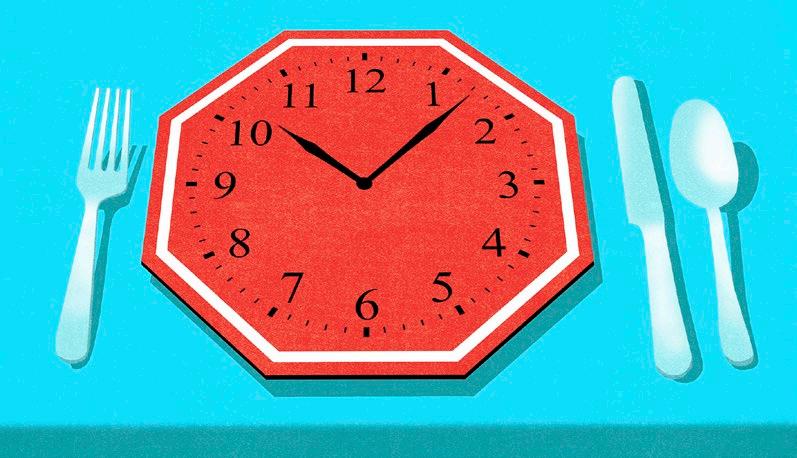
DC. IF could backfire, leading to increased appetite and binge-eating, as well as a slower metabolism. And going without food is a recipe for being “hangry”—you may feel irritable on fast days, says Krista Varady, PhD, professor of nutrition at the University of Illinois, Chicago. What’s more, a randomised control trial published in a 2020 issue of the Journal of the American Medical Association found that most of the fasters’ lost weight was lean muscle, not fat.
Lastly, if you are under high levels of stress or in intense athletic training, consider steering clear. Especially avoid extreme 36:12 fasting, which calls for 12 hours of unlimited eating
followed by 36 hours of zero calories.
“When you do any type of fast, part of the benefit comes from mildly stressing your body; just like when you lift weights, you damage the muscle to make it stronger,” says Robin Foroutan, RD, an integrative medicine dietitian in New York City and spokesperson for the Academy of Nutrition and Dietetics. “With fasting, you are stressing out the body, but it gets stronger in response.” And, if you stick to the programme, it can get thinner too. n
With reporting by Denise Mann, Kim Fredericks, and Corey Whelan
Urinary tract infections can make some people, particularly women, feel needlessly ashamed. “For years, women were told that UTIs were related to their cleanliness, but they’re not,” says Dr Barbara W Trautner, physician at Houston’s Michael E DeBakey VA Medical Centre and a professor at Baylor College of Medicine.
It is true that women get UTIs far more frequently than men, but it’s a matter of anatomy, not hygiene. For anyone, a UTI develops when bacteria in the bladder—usually
introduced via the urethra—cause inflammation or other symptoms somewhere along the urinary tract. Since a woman’s urethra is shorter than a man’s, the bacteria have less distance to travel to reach the bladder. As well, in women’s bodies the urethra opening is closer to the anus, where E coli, a common cause of UTIs, reside.
Another possible misconception about UTIs is that they cause delirium in seniors. Trautner says the evidence around that isn’t conclusive. A fever related to a UTI could be a contributing factor, but
the delirium is more likely to be a symptom of an underlying brain disease, taking multiple medications, malnutrition, untreated pain, or organ failure. Making things even more confusing, Trautner adds, is the fact that bacteria are often present in the urine of older adults without causing harm—a condition known as asymptomatic bacteriuria, which normally requires no treatment.
UTIs do become more common with age, however, for both men and women. In women, estrogen levels drop after menopause and the vagina loses protective bacteria that keep harmful bacteria out. In men, the prostate begins to enlarge after age 50, and can trap urine in the bladder. Also, all older adults are more likely to acquire risk factors such as kidney stones, catheter use, or a suppressed immune system from diseases like diabetes.
Determining whether you have a UTI depends on where the infection is located. In the lower parts of the urinary tract, such as the bladder, symptoms are related to urinating: an urgent need to go, burning while urinating, blood in the urine, or pain in the pelvic region. On the other hand, an infection that affects the kidneys is known as an upper urinary tract infection, and the symptoms are more vague, consisting of back and flank pain, high fever, vomiting, nausea, or chills.
Antibiotics are the recommended treatment for UTIs, but there’s a high risk of recurrence, especially among women. If this happens, it’s not the patient’s fault, says Dr Larissa Grigoryan, an assistant professor of family and community medicine at Baylor. “In some cases, it’s due to increasing antibiotic resistance,” she says, explaining that physicians will then prescribe another course of that antibiotic or try a different one.
HALF OF ALL WOMEN WILL HAVE AT LEAST ONE UTI IN THEIR LIFETIME
Can cranberry juice help? It’s long been believed that it can prevent or cure UTIs. While some research shows that an active ingredient in cranberry juice can prevent bacteria from sticking to the bladder wall, larger studies have not confirmed a benefit. But even if cranberry juice is not a fix, it’s not harmful. In fact, drinking plenty of non-alcoholic fluids is a good prevention strategy. In a 2018 study published in JAMA, women who increased their regular intake of fluids by 1.5 litres each day were less likely to get a UTI.
So, to keep these infections at bay, the best prevention strategy is simple: drink water and empty your bladder often. n
There were ups
You’ve made a mark
There were downs
You’ve lived
Perhaps more than you realise
Triumphs Failures
And children
And now grandchildren
It’s time to tell your story
Love, laughter, tears
The gift of a lifetime
LifeBook is the world’s leading autobiography service.
LifeBook is the world’s leading autobiography service.
Around the world more than 8000 people already enjoy owning the life story of someone they love.
Around the world more than 8000 people already enjoy owning the life story of someone they love.
Each book is a unique piece of family treasure, custom-made and handcrafted, to be shared by generations to come.
Each book is a unique piece of family treasure, custom-made and handcrafted, to be shared by generations to come.
It’s time to tell your story.
It’s time to tell your story.
Find out how by contacting us on 0800 999 2280 or visit lifebookuk.com
Find out how by contacting us on 0800 999 2280 or visit lifebookuk.com


T“Why am I so incredibly and incurably romantic about Cornwall?”
hey say the light is different in St Ives. Perhaps that's what has attracted so many artists to this Cornish seaside town. JMW Turner, Barbara Hepworth, Maurice Sumray, Naum Gabo and Piet Mondrian have all lived for some time in this quaint town, inspired by the stunning nature and that fabled St Ives light. In the 2010 BBC documentary, The Art of Cornwall, presenter James Fox explained that, "For a few dazzling years this place [St Ives] was as famous as Paris, as exciting as New York and infinitely more progressive than London.
- Virginia Woolf
"Today's visitors can learn more about the rich history of St Ives' artist colonies at the town's excellent Tate or Hepworth museums.
And a dazzling art scene isn't all St Ives has to offer visitors. Each September the St Ives September Festival brings music, poetry, films, talks and books to the town. During the popular festival, several pubs around St Ives open their doors for free gigs, local artists open their studios to the public and the 500-seat St Ives Theatre plays host to events.
Born in St Ives in the 1960s, Tony Mason documents his love for his home town on his YouTube channel (CornishPastyMan) and has spent time as a trustee for the St Ives Archive, giving local history tours. Visit stives-cornwall.co.uk

I have lived in St Ives for most of my life and was born here in 1960. I went away for a few years after college but always intended to come home for good before I was 40, which I did, and have remained to this day. St Ives is so much more than a holiday resort. For a small seaside town, there is always something to see and do, with lots of history to explore and research.
I think most St Ives residents are proud to live in an internationallyknown artists' resort, with its vast array of galleries, including the trinity of the Tate, the Barbara Hepworth Sculpture Museum and Garden and The Leach Pottery. The St Ives community is alive and well, with over 20 thriving local groups and social organisations offering residents the chance to participate in and foster that spirit for future generations, and the list is growing. You will hear some say the town is not what it was, in
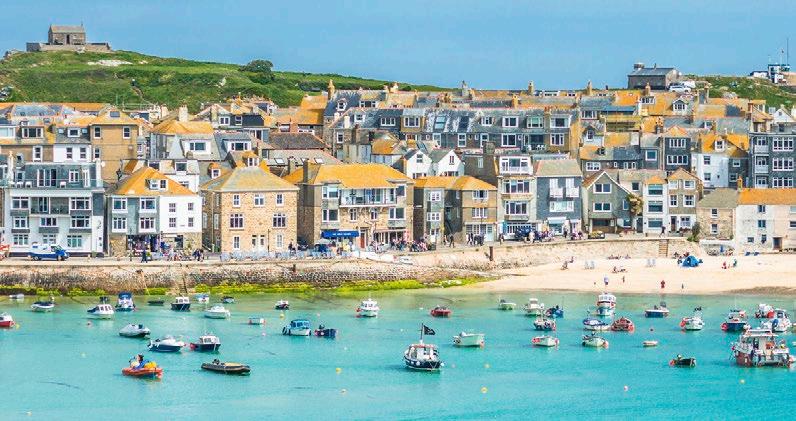
terms of everybody knowing everybody else, but that is true of most places in the modern world. I think we have successfully moved with the times. However, Cornwall has areas of great poverty, with many neighbourhoods among the poorest ten per cent in England, and a great dependence on food banks and food share schemes. There's also a lack of affordable local housing.
In the late 1990s two-thirds of all visitor accommodation were hotels and B&Bs. Today it’s less than ten per cent, with holiday homes making up the vast majority of the town’s bed spaces. With worthwhile investment opportunities so hard to find, the second homes market has boomed nowhere more than in Cornwall. The result is that it's impossible for the youth of today to live in the town, other than by inheriting property. With such dependency on tourism
and its low wages, it is hard to see how this will change.
Being interested in local history, in 2012 I decided to create bespoke videos of every bit of St Ives’ visible history and record all aspects of life in town, which I post to YouTube (Cornishpastyman). In the course of my research I was regularly calling on the St Ives Archive and four years ago was asked to become a Trustee. The Archive has a vast array of information, which greatly broadened the scope of what I thought I had to record while teaching me so much.
I now give guided tours of St Ives in aid of the Archive so our history can continue to be recorded and preserved for future generations.
There's always a new tale to tell, most recently how we hosted the G7 Summit, which we somehow got away with in June!
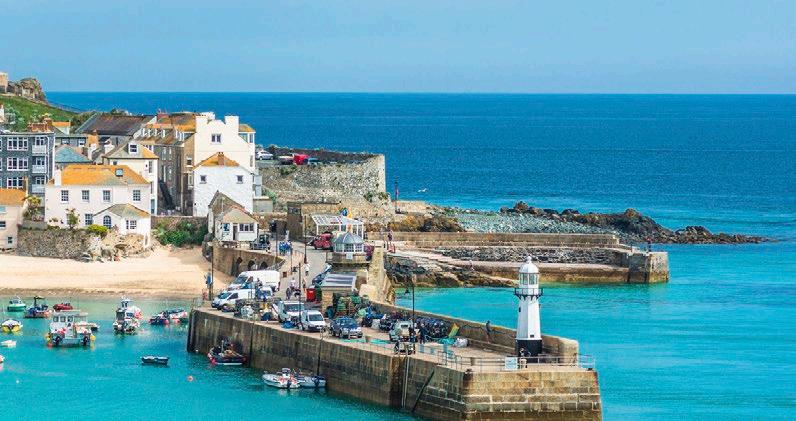
Better known as the St Ives Mermaid, Laura Evans, 34, has lived in St Ives since childhood. Learn more about her work by following her on Instagram: @StIvesMermaid

I was born in St Ives but I moved away from home at a time when I thought the grass was greener. I soon learned that I already had what I had been looking for all along and fell in love with my hometown when I moved back from London.
I love the character of St Ives—the character of the people and of the streets. I love the light and the stillness in the early morning when I go for a swim. I love that I can access the wild outdoors just beyond my doorstep. For

me, being a St Ives resident means the opportunity to be creative and celebrate the diverse art scene we have here. There is an interesting duality in St Ives— conservative and liberal people rubbing shoulders in almost equal numbers, which pretty much sums up the spirit of St Ives.
Sadly I do believe St Ives has become a victim of its own success, much to the detriment of those (especially younger people) wanting to settle here. House
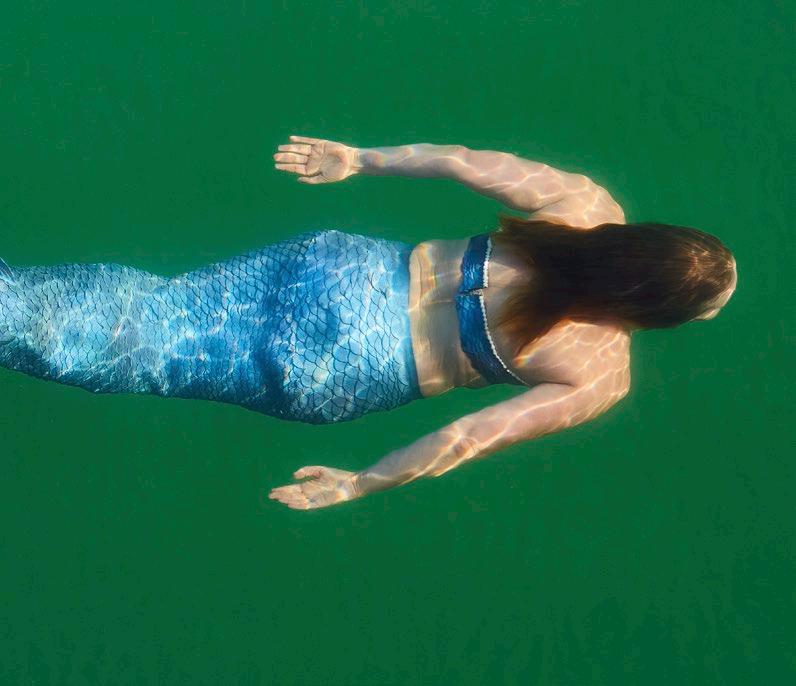
prices are at an all time high and the vast majority of jobs are minimum wage. Many independent shops are being priced out of leases only to be swiftly replaced by bigger brands.
Nature lovers are always drawn to St Ives thanks to the beautiful sea, the wild coast and the wildlife. It truly is the most incredible playground for those who find their joy in getting outdoors. Walking, hiking, cycling, coasteering, sailing, swimming—we have it all.
I created the St Ives Mermaid idea [Laura swims in the sea of St Ives wearing a two-stone, custom-made silicone and neoprene mermaid tail] as a way of giving back to my hometown—the town that has helped and healed me throughout my life. It gives me the opportunity to entertain locals and visitors while also raising money for charity. n
To plan a future visit to St Ives, head to stives-cornwall.co.uk
Jessamyn Stanley is an internationally acclaimed voice in wellness, highly sought after for her insights on 21stcentury yoga and intersectional identity. Her new book, YOKE: My Yoga of Self-Acceptance, is out this month
All bodies would be considered powerful, equal, and necessary. Everybody is valuable and we’re not all meant to look the same. We should celebrate what makes us unique. We should showcase our scars, smile at our wounds, and laugh about our healing. Your journey is why you are here, and your body tells the story of your journey. Don’t devalue it because other people don’t understand it. Body-shaming other people only happens when we bodyshame ourselves.
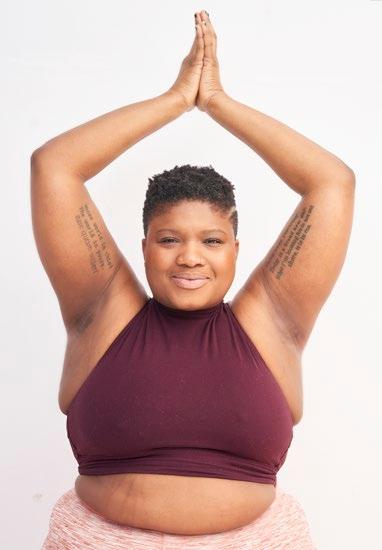
We’d understand that there can be no healing that we can do for our society that we are not practising within ourselves. Healing has become a buzzword, and it’s true that there’s a great need for collective healing on a global scale. But there will be no healing on a global scale if we do not heal ourselves individually. Otherwise, we are just perpetuating the same cycle of violence that we experience internally. You have to accept the complications of your identity and what it means to sit at the centre of many different
intersections. From that space of acceptance blooms compassion, and when you practise compassion for yourself, it becomes possible to reflect it to other people. That’s how we heal our society—we start by looking within ourselves.
THERE WILL BE NO HEALING ON A GLOBAL SCALE IF WE DO NOT HEAL OURSELVES INDIVIDUALLY
Love would always be the answer. No matter what you choose, love is always the result. Even when it doesn’t look like the traditional definition of love. Even if it looks like hate. What looks least like love is always the product of fear—fear of growth, fear of truth. And even when you experience fear and it further mutates into hate, it still always blossoms into love. And if you accept that love is always the answer, it makes the difficulty of answering life’s questions a little more bearable.
Our freedom would be our privilege. You were free from the moment you were born. No one can take it away from you. But there are so many forces trying to own you— nations, ideologies, other people. But none of them can own the spirit
that lives inside you, that burns bright every day. And it’s important for all of us to be free—as long as even one of us is not free, none of us can be free.
We’d live in the moment. In my opinion, one of the greatest lessons of pandemic life has been to live right now, today. Don’t take this moment for granted. Live in the present moment, no matter the cost. Literally stop and smell the flowers. Smile for no reason other than being alive. Hug the people you love and tell them what they mean to you. Find a way to enjoy this moment because it’s always all we have.
We’d protect our time. At all costs, value your time and protect it. Do not spend time with people who drain your energy and manipulate your time. Leave out tasks and jobs that leave you feeling unfulfilled. Treat your time like it’s your greatest asset which, of course, it is. It’s all any of us have in the end.
We’d rest much more. If I were in charge of the world, I would definitely consider mandating naps. There’s a reason we always put kids to bed when they get a bit cranky. Adults need the same thing. Spain’s got the right idea with siestas—we all need to rest so our mind and body can relax and catch up with one another. n
Meditation is simpler than it sounds.
Follow these directions from a sceptic who tried and liked it
By Dan Harris and Jeffrey Warren with Carlye AdlerFrom the book meditation For Fidgety ScepticS


If you had told me as recently as a few years ago that I would someday become a travelling evangelist for meditation, I would have coughed my beer up through my nose.
In 2004, I had a panic attack at work. Unfortunately for me, that meant I was in front of millions of people, delivering the news, live, on the US television show, Good Morning America. In the wake of my nationally televised freakout, I learned that I had undiagnosed depression. For months, I’d been having serious trouble getting out of bed in the morning and felt as if I had a permanent lowgrade fever.
The panic attack ultimately led me to embrace a practice I had always dismissed as ridiculous. For most of my life, to the extent that I’d

Sit and chill for a while

ever even considered meditation, I ranked it right alongside aura readings and Enya.
Further, I figured my racing type-A mind was way too busy to ever be able to commune with the cosmos. And anyway, if I got too happy, it would probably render me completely ineffective at my hypercompetitive job.
Two things changed my mind. The first was the science. In recent years, there has been an explosion of research into meditation, which has been shown to reduce blood pressure, boost recovery after your body releases the stress hormone cortisol, strengthen the immune system, slow age-related atrophy of the brain, and even mitigate the early symptoms of depression as well as anxiety.
Studies also show that meditation can significantly reduce violence in prisons, increase productivity in the workplace, and improve both the behaviour and even the grades of schoolchildren.
Things really get interesting when you look at the neuroscience. In recent years, researchers have been peering into the heads of meditators, and they have found that the practice can rewire key parts of the brain involved with self-awareness, compassion, and resilience.
For example, one study from the Harvard Gazette found that just eight weeks of meditation resulted in
measurable decreases in grey matter density in the area of the brain associated with stress.
The second thing that changed my mind about meditation is that it does not necessarily entail a lot of the “weird” stuff I feared it might. Contrary to popular belief, meditation does not have to involve folding yourself into a pretzel, joining a group, or wearing special outfits. The word “meditation” is a little bit like the word “sports”; there are hundreds of varieties.
The type of meditation discussed here is called mindfulness meditation, which is derived from Buddhism but does not require adopting a belief system or declaring oneself to be a Buddhist at all.
I began my practice slowly, with just five to ten minutes a day, which is what I recommend that everyone aim for at the start (frankly, if you find time for even one minute a day, you can count that as a win).
The practice, thankfully, does get easier the longer you keep at it, but even after doing it for quite a few years, I get lost all the time. Here’s a random sample of my mental chatter during a typical session:
In. Out.
Man, I am feeling antsy. What’s the Yiddish term my grandmother used to use for that? Shpilkes. Right.
Words that always make me giggle: ointment, pianist.
Wait, what? Come on, man. Back to the breath.
In.
Out.
Likes: baked goods.
Dislikes: fedoras, dream sequences, that part in techno songs where the French accordion kicks in.
Dude. Come. On.
In.
Out.
In.
Alternative jobs: papal nuncio, interpretive dancer, working double time on the seduction line…
You get the idea.
To give you a better sense of exactly how simple it is, here are the
super-easy three-step instructions for beginning meditation.
1 Sit comfortably. It’s best to have your spine reasonably straight, which may help prevent an involuntary nap. If you want to sit cross-legged on the floor, go for it. If not, just sit in a chair, as I do. You can close your eyes or, if you prefer, leave them open and adjust your gaze to a neutral point on the ground.
2
Bring your full attention to the feeling of your breath coming in and out. Pick a spot where it’s most
✦ Count your breaths from one to ten, and then start over. Breathe in, one, then out. Breathe in, two, then out, and so on.
✦ reCite a short phrase Some people like to do this to help them stay focused. “Just this breath” is a good one to try. It reminds us not to start anticipating the next breath, or to think about the last one, or to imagine in any of the innumerable ways the mind can cook up that anything else is supposed to be happening—“just this breath.”
✦ reCruit an image. Sometimes I imagine the in breath as a gentle wave moving up the beach, pshhhh, and on the out breath, the wave recedes, sssssshh. Back and forth. Find a mental image that works for you.
✦ give guided audio meditations a shot. Some people wrongly assume that guided meditations are a form of training wheels—or cheating. I disagree. Instructions are quickly forgotten, so having someone in your ear can be really helpful. My advice is to experiment with both audio and solo meditations and see what works best for you.
prominent: your chest, your belly, or your nostrils. You’re not thinking about your breath; you’re just feeling the physical sensations. To help maintain focus, make a quiet mental note on each in breath and out breath, like “in” and “out.”
3Every time you catch yourself wandering, escort your attention back to the breath.
This third step is the key. As soon as you try to focus on your breath, you’ll start having all sorts of random thoughts, such as:
What’s for lunch?
Do I need a haircut?
What was Casper the Friendly Ghost before he died?
This is totally normal. The whole game is to notice when you’re distracted and begin again. And again. And again. It is like a biceps curl for the brain. It is also a radical act: you’re breaking a lifetime’s habit of walking around in a fog of rumination and projection, and instead focusing on what’s happening right now.
People assume they can never meditate because they can’t stop thinking. I cannot say this enough: the goal is not to clear your mind but to focus your mind—for a few nanoseconds at a time—and whenever you become distracted, all you need to do is just start again. Getting lost and starting over is not failing at meditation.
It is succeeding.
I have been meditating for eight years, and I am still plenty ambitious. However, these days I’m not as sweaty, agitated, and unpleasant about it as I used to be back in the day. Meditation has helped me sort out my useless rumination from what I call constructive anguish.
I have learned that the less enchanted you are by the voice in your head, the more you can make room for entirely new thoughts and feelings to emerge.
It has enabled me to take even more delight in my work, my wife, and our son, Alexander, who suffuses me with warmth whether he’s offering me a chicken nugget or wiping macerated muffin on my sleeve.
You’re done!
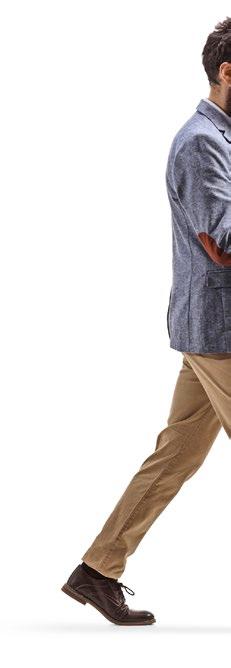
I am certainly less in thrall to my desires and aversions, which has certainly given me a wider perspective and, at times, a taste of a deep, ineffable unclenching.
In sum, meditation empowers you to tap into what lies beneath or beyond the ego. Call it creativity. Call it your innate wisdom. Some people call it your heart. Ew. n

His air-supply cord severed, commercial diver
Chris Lemons had minutes to live BY Simon Hemelryk


was harder for Chris Lemons than for most people. The deep-sea diver was typically away four weeks, several times a year. As Chris, 32, readied to leave one day in September 2012 for a job replacing oil pipes at the bottom of the North Sea more than 120 miles off Aberdeen, northeast Scotland, he gave Morag the usual reassurances.
“Don’t worry. It’s a carefully controlled environment.”
“I’ll miss you,” replied the 39-year-old school headmistress. “But we’ll keep in touch, all the time.”
The couple had met five years earlier at a party
in Dunoon, west of Glasgow, where Morag worked at a primary school. Chris, a 6ft 4 Englishman from Cambridge, was a diver and dive-boat crewman taking a course in the area. He loved Morag’s gregariousness, while she found him kind and funny. They started dating and soon Chris moved in with her. They lived frugally while he trained in specialised saturation (SAT) diving in 2011, a job that involved maintaining seabed pipes for the oil and gas industry. It had its risks, from decompression sickness to drowning—several saturation divers had died in recent decades around the world. But Morag knew how much it meant to him.
And it paid well, helping the couple plan an exciting future together. Their wedding was set for the following April. Morag had recently started work at a school in Mallaig in the Scottish Highlands, and the couple were building a dream house overlooking the sea. They talked about having children, and, after the kids finished their education, moving to France, where Chris had family. It was a joyful time.
It’s called saturation diving because, at the intense pressures found in the deep sea, gas that a diver breathes saturates into his body. When he surfaces and the pressure drops, this gas can emerge as deadly bubbles in his
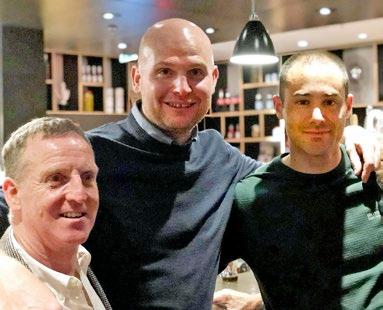
From left to right: saturation divers Duncan Allcock, Chris Lemons, and David Yuasa
tissues—causing decompression sickness, or “the bends.” SAT divers reduce this risk by living full-time in a pressurised chamber within the dive ship.
For this latest job, Chris would be part of a three-man team, sharing the SAT chamber with three other teams for a month aboard the 106-metre vessel Topaz. He was delighted to learn he’d be working with Duncan Allcock.
The 50-year-old had been diving in the North Sea for 17 years and had worked with Chris on his first few dives since he qualified 18 months earlier, becoming Chris’s unofficial mentor. In a competitive industry with only short-term contracts, Duncan had striven to make Chris look good in front of supervisors, giving him advice and nudging him away from mistakes. “If you’re unsure about something, don’t blag it. I’ll talk you through,”
he’d reassured Chris. The pair had become friends; Chris and Morag had recently stayed at Duncan’s house in Chesterfield. Their third team member was to be David Yuasa, whom Chris knew by his excellent reputation.
For the first few days in the chamber, the men chatted about Chris’s house build and upcoming wedding, and Duncan’s son, who’d just started working in diving. Chris couldn’t properly speak to Morag— helium in the chamber made the divers’ voices high-pitched and distorted—but they kept connected
via email, and Morag sent pictures of her adventures cycling or climbing their local mountains.
Just before 9pm on September 18, it was Chris’s team’s turn to dive. The three transferred to a diving bell, which was lowered on cables around 75 metres below Topaz. Chris and David would descend a further 15 metres to replace some pipe on a structure resting on the seabed. Each man was connected to the bell by an umbilical cord attached at the hip to their diving suits. It was a five-centimetre-thick cluster of tubes carrying their air, a communications

1Chris, Dave, and Duncan live for days in a pressurised chamber
2They get into the diving bell through airlocks
3The bell is lowered 75 metres
4When the ship loses control, Chris's lifeline snaps as the bell is dragged away
5More than 30 minutes later, Dave retrieves Chris's inert body and brings him back to the bell
line, electricity for the lamps and cameras on their helmets, and hot water to keep their suits warm on the four-degrees-Celsius seabed. At the core was a steel-reinforced rope.
THE SHIP HAD A BIG PROBLEM. “GET BACK TO THE BELL,” THE MEN WERE ORDERED
Each diver had 50 metres of this lifeline, coiled ready on a rack inside the bell. Duncan would feed this out as needed.
Above water, the wind was about 30 knots and the seas some four metres high. Rough, but nothing Topaz couldn’t handle. Instead of fixed propellers, the ship had five thrusters that could each be rotated. A dynamic positioning system kept the ship locked in place by constantly adjusting these, so there was no need for an anchor.
Though it was a routine job, as Duncan secured Chris’s heavy helmet he told him, “There’s no rush. Take your time.” Chris gave him the thumbs up. He felt relaxed, focused, ready to go.
Dropping through the 80-centimetre hole at the bottom of the bell and into the dark ocean was
always a magical moment for Chris. Leaving behind the claustrophobic SAT chamber and the bell, he felt weightless, sediment and fleeting marine life highlighted by his helmet lamp. He and David started work within the manifold, a structure nine metres high and 20 metres long; its pipes and valves managed oil flowing from wells to platforms. Toiling a few feet apart with wrenches and other tools, the pair would be under water for six hours.
Up on the ship, dive supervisor Craig Frederick sat before a bank of controls and monitors showing the feeds from the divers’ helmet cameras. He followed their progress, giving instructions by intercom for each stage of the job. Meanwhile, in the cramped bell Duncan sat surrounded by gauges. He monitored his colleagues’ oxygen and carbon dioxide levels, but he had no direct communication with them.
Chris had been working for close to an hour when he heard a sudden noise in Craig’s control room. An alarm. Perhaps the crew were running a test?
In fact, Topaz had a major problem. The green light on Craig’s instrument panel was suddenly amber… then red. I’ve never seen that before, Craig thought, alarmed. The positioning system had failed. The boat was drifting—and would soon drag the divers with it.
“Leave your tools and get back
to the bell,” Craig ordered. It was a highly unusual request, but Chris and David started climbing handover-hand up their umbilicals toward the top of the structure. In the bell, Duncan, who couldn’t see what Chris and David’s helmet cameras relayed, didn’t know what was happening but followed Craig’s instruction to start hauling in the cords.
Glancing up, Chris had expected to see the bell’s lights, but there was only blackness. Then he felt his umbilical tugging as he reached the top of the manifold, and saw it had looped around a metal outcrop. He struggled to unhitch it, but the knot only pulled tighter. What’s going on? Chris thought.
In the bell Duncan saw Chris’s umbilical was suddenly taut. Craig ordered, “Give Diver 2 more slack.”
“I can’t!” Duncan replied.
Not only was it too tight, the cord was pulling its rack off the wall, steel struts bending, bolts groaning. It was unthinkable: if the cord broke off, it would leave Chris adrift and without oxygen. Duncan also knew that in this tiny space, if it came loose it would knock him through the bottom of the bell into the water. He quickly climbed onto his seat to get out of the way. But there was nothing he could do for Chris.
As Chris struggled to free himself, David desperately tried to get back to help, flailing his arms against the water. He almost made it. The two
divers’ hands were just a couple of metres apart when David’s cord yanked him away. Chris saw a look of apology on David’s face as he disappeared into the dark.
Chris redoubled his frantic attempts to dislodge the cord. He heard it creak ominously—and then the air-supply line broke, followed by the communications feed. Unable to inhale, Chris opened the emergency air tank on his back, as he’d done many times in training. Seconds later there was a noise like a shotgun as the cable snapped. His lifeline had now severed completely.
Chris was thrown backwards, sinking slowly, his helmet silent without the intercom, his lights dead, his suit beginning to cool. He knew he had about eight minutes of oxygen.
In the bell, Duncan feverishly pulled up the suddenly slack umbilical, hoping Chris would be on the end of it. His heart sank as the broken hot-water hose came up. Then came the hissing air line. He felt sick. “I’ve lost my diver!” he shouted to Craig.
Landing on the soft seabed, Chris struggled to his feet in total darkness. The ship could track him via a beacon on his suit, but he knew there was a better chance of rescue before his oxygen ran out if he could get himself to the top of the manifold. Yet he had no idea where
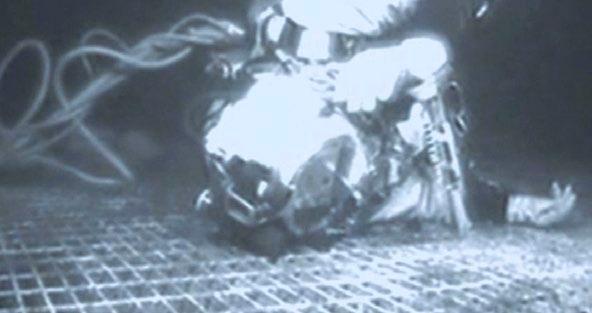
it was. What if he walked the wrong way, into the blackness?
He picked a direction almost at random and took small steps, feeling only the mud beneath his feet. Suddenly his outstretched hands struck metal. He grasped it in relief. He began struggling up the structure, breathing hard.
Reaching the top, he still couldn’t see the bell. Not a speck of light. Where had Topaz gone? He crawled onto the platform and clung to the metal grille, frightened the current would drag him away. He reckoned he had about five minutes of air left, a terrifying thought. He knew his chances of surviving this were slim.
Yet the situation was even worse than he realised. The ship was now some 225 metres away. The crew were desperately trying to steer back, but, without the positioning system, it took two people to manually coordinate the thrusters. Topaz was slaloming agonisingly slowly against the waves.
The minutes passed, and Chris’s fear turned to grief. This is probably
Chris lay in the cold, dark North Sea without air, warmth, or any communication from the ship above
where I die. He’d never see their house finished, never have children.
“I’m sorry, Morag,” he called out. His mind fumbled with mundane practicalities. Does she know when the next payment for the building work is due?
He shouted out for Duncan. “Where are you?”
His chest grew tighter as his oxygen dwindled. I hope dying doesn’t hurt. He felt himself slowly slipping into unconsciousness.
Craig had ordered Topaz’s remotely operated underwater vehicle to go down and look for Chris. It sent back pictures of him lying on the metal grille. His hands seemed to be twitching. But was he still alive, or were his limbs just moving in the current? It had been 16 minutes since the umbilical had snapped.
By now David had made it to the bell, poised to retrieve Chris if they could get back in position. Craig kept him and Duncan updated on the boat’s progress, though he massaged
the truth to keep their spirits up. “We’re nearly there.”
David already assumed he’d be recovering a body. Duncan’s thoughts were darkening, too, and he wondered how he would tell Morag her fiancé wasn’t coming home. The wait was agonising, but he tried to keep hope alive. We’ve not forgotten you, lad. Hang in there.
Attempts by Topaz’s engineers to re-engage the positioning system had been futile, so in desperation they shut it down and restarted it. Amazingly, this worked. But more than 25 minutes had now passed since Chris’s umbilical snapped.
Finally, with the ship over the dive site, David dropped down and found Chris lying on his back. He briefly glanced through Chris’s mask; ominously, there was water inside. He clipped Chris onto him with a rescue lanyard and began hauling them both up his umbilical cord. David was fit, but Chris was a big man; it was like trying to carry a giant starfish. By the time he was able to push Chris’s upper body into the bell, another six minutes had passed.
Duncan unclipped Chris’s helmet. The diver’s eyes were closed, his bald head as blue as a pair of jeans. Duncan knew there was little chance of surviving that long without oxygen, but with nothing to lose, he kept talking. “You’ve had an accident. I’m going to give you CPR.”
He gave Chris two breaths. Unbelievably, Chris suddenly inhaled. His eyes opened. He blinked.
Duncan could’ve danced a jig. He’s back with us! For Craig, watching via monitor, it was a big moment.
“Are you all right?” he asked on the intercom—and Chris gave a weak thumbs up.
Duncan probed Chris with questions after flushing his suit with hot water.
“Do you know where you are?”
“Yeah.”
“You know you’ve had a broken umbilical?”
“Yeah.”
Chris was groggy but, remarkably, seemed himself. Back in the ship’s SAT chamber he got medical attention while David and Duncan had, as Duncan describes it, “a bit of a hug.” Once Chris was stable they visited him. There were more hugs.
Over the next three days, as the men depressurised on Topaz, now docked at Aberdeen, they talked through what had happened, over and over. It helped them deal with the shock. Duncan gently teased Chris about the CPR. “Snogging on a dive is not normally done, you know.”
How Chris survived, and without brain damage, remains unclear. The oxygen in divers’ gas is about four times richer than normal air, so his body may have
been saturated with enough to keep him going. Hypothermia could have put him in shut-down mode, too, sending oxygen to his vital organs.
When Chris phoned Morag, she was horrified and raced across Scotland to meet him as he disembarked Topaz. They kissed, and hugged for a long time. For a distraction, they went to the cinema, but Morag didn’t see a second of the film through her tears.
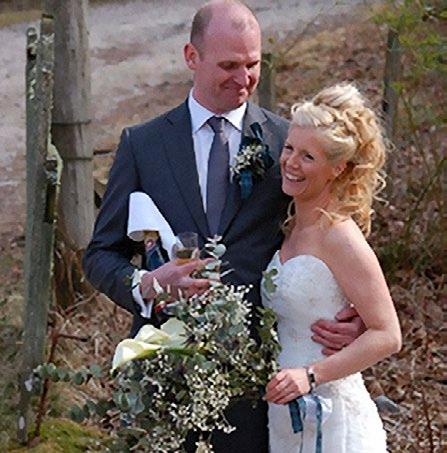
Chris and Morag a few months later, at their wedding “that almost never was”
Three weeks later, Chris was declared fit and returned to the North Sea with David and Duncan to finish the job. “I didn’t want to lose my nerve,” says Chris, who is still a SAT diver.
“I’m proud of him,” adds Duncan. “Many would have said, ‘This is too dangerous. I’m not coming back.’”
The following April, Chris and Morag got married in an emotional ceremony near their home. David couldn’t be there but, says Chris, “at the reception, people were buying Duncan whiskies all night. And they were telling me, ‘I don’t even want to speak to you, I just want to hug you.’”
“A band played until 4am and the place was jumping,” recalls
Morag now. “People knew it was the wedding that almost never was.”
Chris and Morag have since adopted a little girl, Eubh. They finished their house. But their life plans have accelerated. “We’re selling the house and moving to France already,” says Morag, smiling.
“I’ve had a glimpse of dying and I’m not scared,” says Chris. “I know I’m lucky to have a second chance. I always had a lust for life, and the accident only made that stronger.” n
Chris Lemons is available for public speaking. Visit chrislemons.co.uk for more information

In his short, difficult life, a greasy meal and a soda were a balm for my father.
Every time I eat a chicken nugget, I feel close to him once again
 By C Pam Zhang Ad A pted From The New York Times
By C Pam Zhang Ad A pted From The New York Times
It’s autumn again, the eighth since my father died, and I’m craving chicken nuggets. My father would have understood. I don’t remember him saying “I love you,” which isn’t a common phrase in Mandarin, his preferred language. We always had a bit of a communication issue. But his love language was the simple pleasure of processed food.
I have a photo of the two of us, taken when I was two, at the gleaming flagship McDonald’s in Beijing. In the photo, I’m feeding my father a fry. We both beam.
My father was the fun parent, the indulgent one. He introduced me to fries, squirty cream straight from the tube, and fizzy drinks. My father never reprimanded me for overindulgence as my mother did. He laughed. It didn’t seem to matter, then, that his English wasn’t fluent, or that my Mandarin was already slipping away.
Our language of junk food evolved into one of secrets: a conspiratorial Happy Meal on our fishing trip alone, two litres of Coke guzzled together before my mother came home. I felt honoured until I began to understand that my father kept secrets from me too.
In third grade, I came home newly evangelised to the dangers of cigarettes and threw away my father’s packs. He raged, then promised to quit, but I kept smelling smoke in his clothes and car.
My father was not virtuous. He was a man of vices and quick pleasures: processed foods, nicotine, gambling, adultery. I didn’t ask why he turned to these—that wasn’t how our family operated, and anyhow, language remained a barrier.
Instead, I distanced myself. I knew the person I aimed to be, and that person was not reflected in my gambling-addicted, divorced, blue-collar father. He had become a shameful artifact, one I wanted to leave behind. I focused on my own life with the impersonal callousness of youth.
My father died two years after I graduated from university. He was 49. I was 22. I grieved his passing, and then I grieved the fact that I never fully knew him. There were questions I had never thought to ask and nuances I hadn’t been able to articulate in my language or in his.
I used to blame my father for the weakened body that killed him—a product, I thought, of his weakened virtue. But the older I get, the more I see myself compromising too.
And so, each autumn, I think: Now I’m the age at which my father followed his spouse to a country where he didn’t speak the language; now I’m at the age at which he was fired from his job and took a minimum-wage gig; now I’m at the age at which he found his first online gambling website, as irresistible to him as the dumb games on my phone are to me. And at each
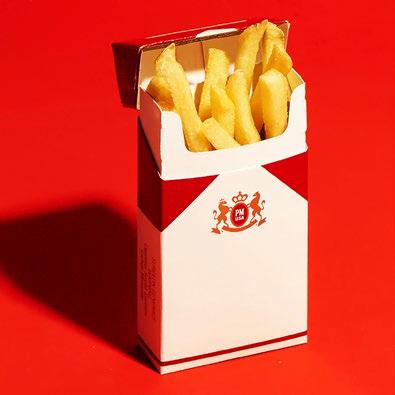
intersection, I think: The age I am is far too young for the responsibilities he bore. How can I resent my father for being the product of such a staggeringly unfair world?
I can imagine the giddy power my father must have felt upon moving to the US to discover that McDonald’s was now the stuff of everyday. It was cheaper than fish, much more accessible than fresh fruit, and simpler than a long-distance phone call to Beijing in which he felt compelled to hide his difficulties, his loneliness and alienation.
And I can imagine, too, the balm of preternaturally smooth processed meat to a tongue made clumsy by
translation; how sugar might soothe an ego bruised by rejection, racism, and the need to ask whether a store accepts food stamps. Under such conditions, the demand for perfect virtue feels impossible, even cruel. I can imagine how it might be easier to hand your child a golden nugget— how the gesture is a promise of abundance and pleasure, however short-lived.
There are vices we must allow ourselves, even if they theoretically shorten our lives by a day or a week or a year—because first we have to get through this day, this week, this year.
Is it wrong to compare my father to a processed piece of deepfried food? Because I think of him whenever I bite into one. It’s a more faithful representation than the usual metaphors of fathers as safe harbours, rocks, or teachers. None of those really rings true when it comes to my father.
The next time the urge strikes, I’ll have a nugget or two or four. There will be the rush of additives, the hit of engineered pleasure. And in that moment, in a communion across a golden crust, I will understand my father completely. n
Before 1882, the word jumbo referred to a clumsy person.
But that year, PT Barnum bought a huge elephant named Jumbo to star in his circus, and the original definition expanded by several tons
The flavours of “Rainbow Ice Cream” from Otaru include green tea, Yubari melon, Hokkaido milk, chocolate, and lavender

A journey that’s extra special thanks to unique local flavours
By Michael ColbertFrom Gastro obscura via atlasobscura.com photos:©
If you ask Lynn Ng which flavour of soft ice cream is her favourite, she’ll probably say scallop. “It’s actually really delicious despite seeming like such an incompatible mix,” she says.
Four years ago, Lynn and I worked as assistant language teachers at a high school in Hokkaido. Hokkaido is Japan’s northernmost prefecture, an island comprising some 20 per cent of the nation’s landmass but less than five per cent of the population. For many, Hokkaido is synonymous with road trips and inaka: the countryside. This meant Lynn and I spent weekends on the local roads in her Toyota Passo.
One of our first trips brought us to Wakkanai, the northernmost city in the country. From Cape Soya, we waved at Sakhalin Island, which belongs to Russia. Lynn was the only one licensed to drive, so we punctuated our trip with stops at michi-no-ekis,
or roadside service stations. At a stop in Sarufutsu, we ordered cones of soft ice cream (referred to in Japan as “soft cream”). It wasn’t vanilla or chocolate. It was blue honeysuckle.
Creamy and thick, Japan’s soft ice cream is popular throughout Hokkaido, and Japan as a whole, and many towns showcase their local identity through unique flavours. The flavour of the city where we lived, Takikawa, was apple, an homage to the orchards in one of the farming districts. The city of Furano and the small town of Biei offer lavender and rose, like the flowers they are famous for. And in the small city of Yubari its melon soft ice cream is cheaper than its famous King

melons, a pair of which has sold at an auction for more than 5 million yen (£32,000).
While flavours like these honour Hokkaido’s gardens and orchards, which can be buried under snow most of the year, in the rest of Japan the flavours can get more inventive. Ishii Miso Brewery in Matsumoto, a mountain city in Nagano prefecture on Japan’s main island of Honshu, makes soft ice cream with their miso (a fermented soybean paste). In Japan’s former capital city, Kyoto, you can find yuba ice cream, flavoured like the skin that forms over boiled soy milk. And the city of Hakodate, which sits on Hokkaido’s southern tentacle, slaps visitors with black squid-ink ice cream.
Ocean brine and ice cream might seem unlikely partners, yet these flavours of soft ice cream celebrate Japan’s regional identity. The country is long: to drive from Wakkanai at the north end of Hokkaido to Kagoshima on the southern tip of Kyushu island would take 38 hours nonstop and cover some 1,680 miles. Japan also extends through varied landscapes and climates. The michi-no-ekis where these unique soft ice creams can be purchased are key aspects of the nation’s plan to revitalise its regional communities, particularly those in rural areas. The Ministry of Land, Infrastructure, Transport, and Tourism oversees these roadside stations and
uses them as a venue to showcase local specialties.
Rural revitalisation is a potential solution to a problem perplexing Japan: an ageing population and declining birth rates. Though this demographic quandary puzzles the entire nation, the pressure pinches rural areas more acutely. As young people have re-located to cities, “ghost houses” stand as a testament to the contraction of towns and villages. Shigeru Ishiba, former minister of regional revitalisation, has listed “establishing corporations in rural areas to promote and sell local goods and tourism” among efforts to stimulate the countryside’s economy.
My friend Lynn Ng now researches rural revitalisation and tourism at Tokyo’s Waseda University. One approach that stands out to her is Fukushima’s. Following the 2011 earthquake and consequent nuclear disaster there, the region experienced a major outflux of people, which prompted officials to get creative.
“Some local governments loan out temporary rent-free houses to visitors so that they have a free place to stay in the region while job-hunting and flat-hunting,” says Ng. “It’s extremely helpful for anyone hoping to relocate without connections or having already secured jobs in the rural regions.”
In addition to drawing new residents to rural areas, Japanese officials promote movement and


exchange among urban, suburban, and rural locales. To entice people to the countryside, the Ministry of Agriculture, Forestry, and Fisheries (MAFF) has come up with a plan to make it more attractive, and food plays a role. Its “Savour Japan” effort spotlights regional flavours, highlighting produce in many of the country’s prefectures.
Why food? Perhaps it has something to do with the power of the Japan Agricultural Cooperatives, known as the JA Group, which lobbies for the country’s agricultural interests. Or perhaps it’s a bit more sentimental.
“Food especially stands in a rather emotional domain compared to other
 Clockwise from above: Traditionally dressed women enjoy cooling treats in Japan’s former imperial capital, Kyoto; this Hokkaido farm’s lavender is used to flavour local ice cream; melon ice cream is the flavour of Yubari
Clockwise from above: Traditionally dressed women enjoy cooling treats in Japan’s former imperial capital, Kyoto; this Hokkaido farm’s lavender is used to flavour local ice cream; melon ice cream is the flavour of Yubari


Clockwise from top left: Specialty treats help draw people out of big cities, including to the Mount Fuji area; black squid-ink ice cream in Hakodate, Hokkaido prefecture; the Usa Jingu shrine on Kyushu Island, the southwesternmost of the Japan’s main islands, is one of many attractions awaiting travellers who take on the full ice-cream trail from north to south

products like pottery or clothes,” says Ng. “And since tourism draws on a tourist’s emotions and imaginations, a tourist might more easily remember some soft ice cream they ate on a trip than the displays in a castle.”
Touting local specialties and boasting hometown pride have deep roots in Japanese culture. Every town, no matter how small, is famous for something. For many, those famed products will be extracted and swirled into soft serve. Also tapping into this is the concept of omiyage: when people go travelling, they’re expected to bring back a gift, typically a single-serving, individually wrapped edible novelty that represents the place they visited.
“I think what really ties in with soft ice cream flavours and rural revitalisation is this concept of meibutsu [famous items and foods] and the omiyage culture,” Ng says. “Because of these things, people are rather obsessed with figuring out what is ‘famous’ about a place” [See box].
Soft ice cream is not the only example of this tourism strategy. Michi-no-ekis sell commemorative books so visitors can prove they’ve visited a city with a locally branded stamp, and Japanese cities and prefectures organise travel experiences around these stamp rallies. On a local level, Ng gives the example of Tsuetate Onsen, a historic hot-springs town on the island of
Kyushu: it attempted to become a hub for custard by encouraging visitors to earn stamps with the purchase of the sweet treat at ten local shops and restaurants, which they could then redeem for a souvenir.
But while stamp rallies tend to focus on regional areas, soft ice cream is national: road trippers and tourists can sample unique flavours all over Japan. Dairy is also a valued industry in Japan: last summer, MAFF reportedly asked people to eat ice cream every day as part of its Plus One campaign to boost dwindling dairy-product sales due to COVID-19.
“I think soft ice cream works especially well because the Japanese—or anyone, really—tend to have this soft spot for ice cream in general,” says Ng. “That makes it quite an easy product to sell.” Given people’s positive associations, soft ice cream is a potent promotional tool.
So while novel flavours such as black squid ink and sunflower stand out for visitors, the goal is to represent a region faithfully— something that locals can appreciate just as much. That’s why, if you press her, Lynn will admit that her real favourite flavour is apple: the flavour of Takikawa, where we lived as language teachers. “It is ten per cent delicious,” she says, “and 90 per cent imbued with all my affective attachments to Takikawa.” n

Confused about equity release? Get the facts.

Equity release has soared in popularity, yet many people still have questions over how the process actually works.
In our guide we explain how to boost your finances by releasing money tied up in your home. Packed with customer stories, facts and figures, why not find out if equity release could work for you?
Get your FREE copy of the Reader’s Digest Guide today.
0800 029
For your FREE GUIDE call us now on: or visit: www.readersdigest.co.uk/er2
1233
This is a Lifetime Mortgage which may impact the value of your estate and could affect your entitlement to means tested benefits. To understand the features and risks, ask for a personalised illustration. Reader’s Digest Equity Release is a trading style of Responsible Life Limited. Only if your case completes will Responsible Life Limited charge an advice fee, currently not exceeding £1,490.
It is never too late to make plans to accomplish your lifelong goals. With the most popular equity release product, a Lifetime Mortgage, you can obtain a tax-free cash lump sum all while achieving your long-held dreams.
Whether you want to fund home improvements or gift a house deposit to loved ones so that they can kickstart life in their own space, low interest rates and customer-focused safeguards make it the perfect time to access the wealth of your home.
Other popular reasons our customers give for releasing equity include clearing an existing mortgage, boosting disposable income or taking the trip of a lifetime.
Regardless of why you want to unlock some financial breathing space, our Information Team can tell you more about how you can achieve your goals with equity release. By calling today on 0800 029 1233, they will answer your questions and help you find out how much you could release.
Releasing equity from your home could limit your entitlement to means-tested benefits and reduce the future value of your estate. However, Reader’s Digest Equity Release can help you understand the implications of a Lifetime Mortgage by offering you a free, no-obligation appointment with a fully qualified adviser.
Your personal adviser will guide you through your journey with equity release to achieve the best result for you and your family.
Call us to start achieving your goals with equity release today.
Two years ago , w hen a relative was posted to Santiago, Chile, we could not pass up the opportunity to visit her. She had planned an itinerary for us, so after a few days in Santiago— including viewing the city from the top of San Cristobal de las Casas and a cable car— w e travelled north to stay overnight in La Serena. Here the overhead electric wires were rather a worry, but the locals were very friendly and eager to practise their English.
Continuing north we visited an observatory near Vicuña and it was truly amazing to see the Southern sky at night with the guide pointing out various constellations and, of course, the Southern Cross. From there, we travelled inland through the Elqui


Valley past many grape vines, finally arriving at the small town of Pisco Elqui. It was here that I tried the famous local drink, the Pisco S our, and indeed it was very sour!
Here the metalled road ran out and we had a few miles of hard sandy track to drive to reach our “igloo’”home. The water supply





was direct from the Andes Mountains and was freezing cold. Taking the coast road back down the spine of Chile we stopped off at the beach resort of Cachagua where we saw our first penguins in the wild.
Our final stop was the port of Valparaíso where there was spectacular graffiti and colourful houses. Valparaíso is built on steep hillsides and because of its architecture and funicular railways it has been awarded Unesco world heritage status. n
Tell us about your favourite holiday (send a photo too) and if we print it, we’ll pay £50. Email excerpts@readersdigest.co.uk

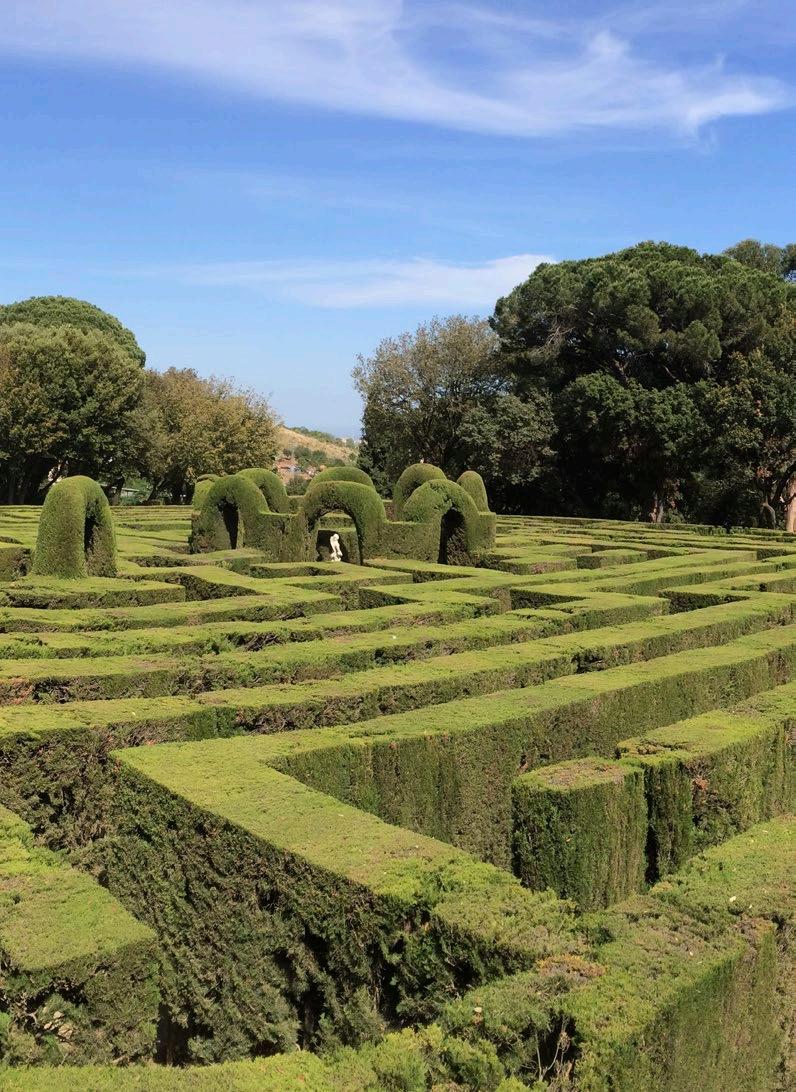
Gaudi buildings, tapas, the beach, La Rambla… with so much to see, it’s no wonder that few Barcelona tourists ever frequent the northern hillside district of Horta. If you can spare a few hours—and quite possibly several more—however, then some old-fashioned fun awaits.
A hedge maze is the headline act of Horta’s Labyrinth Park (or Parc del Laberint d’Horta). Some 750 metres long, its numerous twists, turns and— dammit—dead ends are segregated by manicured, two-metre-high cypress trees. You enter beside a marble bas-relief depicting troubled lovers Ariadne and Theseus, and will find (hopefully) the centre marked by a statue of that old romantic, Eros.
Begun in 1791 by the wealthy Desvalls family, Horta’s Labyrinth Park is Barcelona’s oldest conserved garden. First came the maze and adjacent Italianinspired terraces, forming today’s “Neoclassical garden”. Found just above, its “Romantic” equivalent followed about 60 years later, with all 136 acres becoming a public space in 1971.
Besides the maze, pavilions, ponds, a waterfall, forebodes, meadows and woodland also await. There are superb city views, too, and look out for the Desvalls’ former house—now a private residence but still topped by its original medieval watchtower.
In normal times, only 750 daily visitors are admitted to the park; for much of the pandemic, that has been reduced to 250. Access costs a strangely precise €2.23, or zilch on Wednesday and Sundays, and opening time is 10am. Take the Metro to Mundet and then walk uphill past a velodrome. n
By Richard Mellor Photo:© Kris Arnold/flic K r
Getting on the housing ladder for the first time has never been so expensive.
The average house prices are at record highs and continue to grow, fuelled by the stamp duty holiday and a desire for people to have more space post pandemic.
This means much larger deposits are needed (despite the return of 95% mortgages) and bigger salaries to meet lenders’ affordability tests.
And though a decent number of people have seen their savings pots
grow while stuck at home, there are plenty more who see the everincreasing property prices as the final nail in the coffin that could mean they’ll always be renting.
Enter the bank of Mum and Dad, still seen as a necessity by many with dreams of owning. And judging by our On The Money inbox, this is something you’re worried about.
Here’s a selection of the questions you’ve sent through about supporting your children in buying their first home.
Q: I want to give my daughter a one-off gift of £5,000 to help her place a deposit on her first property. But as I’ve never done something like this before, I don’t know if there will be tax to pay on it? Can you please advise? Elaine
The rules for gifting money from a parent to a child are the same, whether it’s to buy a home or any other purchase.
There’s no tax due unless you die within seven years of giving the money. If that was to happen it’d be lumped in with your full estate and subject to inheritance tax, assuming it’s over the total threshold. The tax rate also reduces depending on how many years have passed, and will be less if it’s between three and seven years.
However, each year you get an annual gifting allowance, meaning you can give £3,000 without any tax due. This is a personal allowance too, so if you are in a couple, then your other half could also do the same. You can also carry over all or part of the allowance for one year, meaning if you didn’t use it last year, you can give up to £6,000 this time around.
The last thing to note is the mortgage lender might require evidence that the money is a gift rather than a loan.
Q: My son has a good job, but he’s struggling to get a mortgage. He has asked me—as I own my house outright—if I would be his guarantor? This idea scares me as it would put my home on the line.
What should I do?
Laurence, 65
You’re right, Laurence, this could put your home at risk so it’s not something to take lightly. A guarantor mortgage usually means you put your home up as security on the loan. This can allow someone with no deposit to borrow up to 100% of the property price.
You wouldn’t need to provide any money upfront and it’s unlikely you’d be backing the full amount. Depending on the mortgage, you’ll probably have to agree to liability for between 5% and 25% of the total loan. Hopefully it’d never be an issue, and once your son has built up enough equity he’d be able to remortgage to a deal without the need of your support.
But if your son gets behind on payments then you legally have to pay up. Though the lender will repossess the mortgaged home first and sell it, any shortfall will still need to be met. And if you don’t
have the cash available to do this, then the lender could force you to sell your house.
There’s also an alternative form of guarantor mortgage that is based on savings. You’d need to have the desired sum available, and it’d be locked away until equity has built up.
However, these types of mortgage are usually for those with no deposit, low wages or a poor credit report. If your son earns a decent amount that would hopefully exclude the first two reasons. Speaking to a mortgage advisor might help him find an available deal better suited to him that doesn’t include you, and would hopefully also have lower interest rates.
And, of course, there are a number of schemes out there which could help make buying affordable, including the Help to Buy Equity Loan scheme, Lifetime ISAs, Shared Ownership and the new First Homes scheme. These are all worth checking out too.

Q: I’ve been paying into my son and daughter’s Help to Buy ISAs but just realised that there is a limit of £200 per month. I have been paying in far more than this at times. What will happen? Will they lose the money? Juliana
Ultimately they won’t lose the money you’ve put in—it’s yours to give—but they won’t get the 25% bonus from the government on anything above the monthly limit.
I’d check with the banks, though, to see what they’ve done with the excess cash. It could be they have already rejected the additional money and returned it to you.
Also, it might be worth transferring the money in the Help to Buy ISA to its replacement, the Lifetime ISA. It’s very similar and they’ll get the same bonus on money saved there. But there are a few key differences.
The main one is you can save up to (and transfer in) £4,000 in a LISA each financial year, and there’s no monthly limit. So you’ll be able to add more money if you have it. It can also be used towards more expensive properties outside of London.
However, the account must be open for 12 months before it can be used, which won’t be any good if they plan to buy sooner. Plus if they don’t use it towards their first

home (perhaps it costs more than the £450,000 allowed), the money can’t be withdrawn fee free. The only option to avoid this 25% charge is to put it towards retirement—meaning accessing it at 60.



An indulgent cookie recipe was an absolute must when developing our Forking Wellness recipes. There are some meals that are good for us on a more nutritional level and some that are simply good for the soul! We both have memories growing up and
spending time in the kitchen trying to perfect the ultimate homemade cookie recipe and we really do feel we have nailed it with these! They are melt-in-your-mouth delicious and just perfect for the whole family. Here’s our recipe!
1. Melt the butter in a saucepan over mediumhigh heat until it starts to turn golden. Pour into your mixing bowl.
2. Let the butter cool in the fridge until it’s a room-temperature consistency—you want your butter to be solid (if you use it when it’s still liquid, your cookies will be flat).
3. Preheat oven to 180°C (350 F) and line a baking tray with baking paper.
4. Once the butter has set, cream together butter, both sugars, egg, and vanilla for 2 to 3 minutes until the mixture is pale and fluffy.
5. Add in the flour, baking powder, and salt until combined—overmixing will make the cookies tough.
6. Stir in the chocolate chips.
7. Take 1/4 cup of dough and shape into round balls.
8. Bake 8 to 10 minutes, until the top and edges are just golden.
9. Cool cookies on baking sheet for 2 to 3 minutes before moving to a cooling rack.
Forking Wellness: Your No-Nonsense Guide to Health and Nutrition by Sophie Bertrand & Bari Stricoff (Meyer & Meyer) is out now in paperback and ebook
• 285 g (1 1/4 cups) butter
• 105 g (1/2 cup) castor sugar
• 215 g (1 cup) brown sugar
• 1 medium egg
• 1 tsp vanilla
• 328 g (2 1/2 cups) white or wholemeal flour
• 1 tsp baking powder
• 1/2 tsp salt
• 425 g (2 1/2 cups) chocolate chips (we mixed white and milk choc chips)


Isn’t chicken parma Italian? is probably what you’re thinking right now—and, well, you’re partially right. The traditional Italian parmigiana is in fact made from baked aubergines but it got a meaty makeover in the Land Down Under, with chips and salad thrown in for good measure.
Affectionately called a “parmy” by Aussies, you’ll be hard pushed to go into any pub or bistro in Australia and not find a parma on the menu. Hearty, quick and simple to cook, it makes for a perfect family dinner dish or accompaniment to a couple of pints with friends in the garden.
1 Pre-heat the oven to 180°C. Halve the chicken breasts horizontally so you have 4 even pieces. Season to taste with salt, pepper and oregano.
2 Spread the flour over a plate, pour the egg into a shallow bowl, whisk together the breadcrumbs and Parmesan and spread over a second plate. Working with one piece of chicken at a time, toss the chicken in the flour, dip in the beaten egg, then press in the breadcrumb mixture so that both sides are throroughly coated. Repeat with all remaining pieces.
3 Heat the olive oil in a large frying pan over medium heat. Cook the chicken for 2 minutes on each side, then remove.
4 For the sauce, heat the oil in the same frying pan. Cook the garlic until fragrant. Pour in the passata and white wine, then stir through the oregano, salt and sugar. Season with black pepper, then bring to a simmer. Cook the sauce until it starts to thicken. Remove from the heat and stir in half of the basil.
5 To assemble the dish, spread 4 tablespoons of the sauce over the base of a baking dish large enough to hold the chicken in one layer. Place the chicken on top, pour over the remaining tomato sauce, leaving some crumbed edges visible and top each breast with mozzarella and Parmesan. Drizzle over a little more olive oil, then bake in the preheated oven for 15 minutes until the cheese is melted and bubbling.
6 Divide the chicken between 4 warmed plates, sprinkle over the remaining basil leaves and serve with a simple green salad and/or chunky chips.
Serves: 2
Cooking time: 45 mins
For the chicken:
• 2 chicken breasts
• 1 tsp dried oregano
• 2 tbsp plain flour
• 1 egg, lightly beaten
• 75g breadcrumbs
• 25g Parmesan, grated
• 3 tbsp olive oil
• salt and black pepper
For the sauce:
• 1 tbsp olive oil
• 2 garlic gloves, minced
• 500ml tomato passata
• 125ml white wine
• 1 tsp oregano
• 1 tsp salt
• 1 tsp sugar
• small bunch fresh basil
• 125g fresh mozzarella, torn
• 50g Parmesan, grated
• black pepper
Impress friends with your very own handmade party game
Time to apply some sun lotion and dig out the shorts; summer is here! To celebrate, I thought it would be fun to make some party games that I can take to barbecues and summer gettogethers. And I’ve started off with a classic: ring toss! I had so much fun with this project—not just playing it, but making it too. It was fairly simple to build, and yet I managed to surprise quite a few guests when I tell them it’s handmade…
You will need
• 2 planks of wood, each 60cm x 10cm
• 4 planks of wood, each 25cm x 10cm
• A thick wooden rod (I used a curtain pole)
• 5 x small wooden dowels
• Sandpaper
• Power drill
• Strong wood glue
• Wood clamp
• Outdoor wood paint or stain (optional)

Mike Aspinall runs one of the UK’s most popular craft blogs, The Crafty Gentleman, where he shares free DIY tutorials
What to do
1. Take one of the smaller planks of wood, and glue it to one of the larger pieces, so that the ends line up. Use strong wood glue, and follow the instructions on the bottle.
2. Clamp them tightly together, wipe off the excess glue, and then leave to dry (you could also add a screw or nail to further secure the wood together, but this is optional).
3. Repeat this process three more times with the other small lengths of wood, so you’re left with two separate sections, each consisting of three wooden pieces. They should be double layered at the ends, with a small gap in the middle.
4. Use a wood plane and sandpaper/ electric sander to smooth down all of the edges of the wood, so that the sides are completely flush and smooth.
5. Lay the two sections of the base over one another (with one facing up, the other facing down), so that they slot together in the middle gap. They should fit snugly together into a cross shape.

6. Drill a 1cm hole into each end of the cross, and through the centre (five holes in total).
7. Now the base of the DIY ring toss game is constructed, it’s time to make the poles. Cut the thick wooden rods into 5 x 20cm lengths. Sand the edges smooth.
8. Drill a 1cm hole into the circular flat end of each rod.
9. Insert a 1cm dowel into the hole in each rod. Do not insert the dowel all the way—leave half of it protruding out.
10. To make the rings, tie some thick rope into a small loop (braid it together to make it chunkier, if necessary).
When you’re ready to play your DIY ring toss game, simply fit the two base pieces together and slot in the rods to the holes—ta-dah! I love that it’s so easy to take apart, making it the perfect portable garden game for the summer. n





As we get into the hottest month of the year, Catherine Summers sings the praises of a staple summer dress
Something I didn’t wear at all last year was a summer dress. That's despite the fact that I've always loved a classic, cotton, full-skirted dress—preferably a solid colour (or simple print)—because it appeals to the girlishness in me. I think we can all agree that 2020 was a write-off where frivolous summer dressing was concerned, so here’s to changing that.
This year, therefore, I’m taking back the sundress. Assuming we get to see a decent summer after the very wet spring we’ve had, I’ll be going through my collection of summer frocks and seeing what will stay and what needs to go.
I’m generally very ruthless when it comes to decluttering my wardrobe, but to be honest, summer dressculling won’t be easy as I know well

Catherine Summers is an award-winning fashion blogger, posting regularly on her website, notdressedasalamb.com and on her Instagram account, @NotLamb
in advance that I’ll find excuses to keep them all. When decluttering I tend to decide in an instant whether something is a solid keeper, one for the selling pile or one for the charity shop. Be that as it may, summer dresses tend not to get so much wear in the UK so they stay in pretty good nick. Their condition can last as long as the desire to wear them (if not longer). So if you choose carefully—and go a little more classic than anything too on-trend—you could potentially build up a small collection of summer dresses in your favourite colours and/or patterns that could see you through British summers for years to come.
Without doubt, my number one favourite summer dress would be a sunshine yellow fit-n-flare style. Two reasons for yellow: one, it’s the obvious colour choice for summer (colours don’t come more summery than a warm, golden tone). And two, Olivia Newton-John in Grease.
I wasn’t obsessed with Sandy à la red lipstick and spray-on leather pants; no, I wanted to be “before” Sandy at
the diner in her sleeveless yellow sundress with the full skirt. I asked my skilled seamstress mother to make me an identical Sandy dress, and I was forever grateful that she delivered.
My second choice would absolutely be a black and white gingham version.
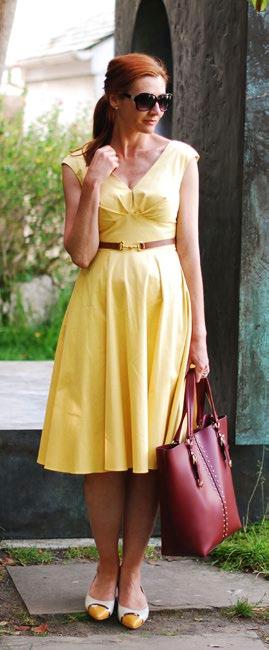
Evoking thoughts of Brigitte Bardot in the 1950s, it’s been a classic for decades (my current high street pick would be the Bernie Gingham Dress by Hobbs). Apart from my 2020 nodresses blip, my own gingham dress with a wraparound belt comes out year after year styled with different accessories each time. Gingham. Black and white. Fit and flare. None of those features can date.
The beauty of a classic sundress

is its add-shoes-andyou’re-ready aspect. My dresses are ready waiting for the sun and a trip to the local café; meanwhile, I need a reason to stop myself adding to my collection with the perfect blend of yellow and gingham in the Saffron Yellow Gingham CottonBlend Shirt Dress from LK Bennett… it’s all my summer dresses dreams come true. With its neat collar and sleeves with tie detail, it’s one magnificently sunny piece. I’d like all the warm weather magnificence I can get in 2021. n
Jenessa Williams wipes away the mirror mist and learns how to steam your face sensibly
What Is It?
Steaming has long been synonymous with rest and relaxation, a way to let out bodily toxins and feel refreshed. One of the cheapest ways to open up your pores, it relies on hot water and heat expanding cells to release a cleansing sweat.
Though many of us have been steaming our faces for years over a sink, there are now products to refine your steaming experience. From handheld mini capsule devices right through to wearable cone contraptions and botanical aromatherapy, this pore-opening process has had a luxury makeover, with benefits both physical and mental.
What Are The Benefits?
Promoting circulation, releasing trapped sebum and acne-causing bacteria, hydrating the skin…the benefits of facial steaming are seemingly endless. Steam increases skin's permeability, making blackheads easier to remove and boosting the absorption of cleansing creams and serums. It can also help with sinus congestion, particularly useful during the hayfever months.
To steam at home, drape a towel over your head before holding your face six inches above water, or steam with a damp warm towel, placed loosely over the face for five minutes. Cone-style electronic steamers are often more powerful, so need a shorter exposure time. Make sure to secure hair away from your face, and add your favourite essential oils— eucalyptus, lavender and chamomile are all wonderfully soothing. Some beauty experts even recommend steaming with herbal tea instead of water for extra invigoration, but those with sensitive skin should tread carefully.
Does it actually work?
Affordable and accessible, steaming can be a great way to de-stress. However, it is possible to overdo it. One session a week is plenty, and care must be taken to avoid burns—water should be warm but not piping hot. Hydrate before you begin, and prepare the skin with a gentle exfoliator for maximum benefit from the pore-opening steam. For simple skin clarity, we say full steam ahead! n
Looking after yourself as a Dementia carer
For the 700,000 family members in the UK who look after a person with dementia, caring can be a 24/7 job.
“I have seen first-hand how easy it is for family carers to ignore their own health and social care needs whilst trying to meet the changing needs of their loved ones,” says Paulette Winchester-Joseph, a specialist Admiral Nurse with Dementia UK. “As dementia progresses, carers may find it increasingly challenging to prioritise themselves.”
Although it can be difficult, it’s important to look after yourself as a carer. These tips from Dementia UK will help you to build selfcare into your routine so you feel physically and mentally healthier, and more able to enjoy the time you spend with the person with dementia.
1. Take care of your health and wellbeing
• stay physically active: go for a walk or cycle, swim, do yoga, try an online exercise video, or join a local fitness class or sports team
• keep your mind active: read books or the newspaper, do puzzles and crosswords, or play cards or board games
• make time for regular dental, eyesight, hearing and other health checks


• don’t ignore physical or mental symptoms like aches and pains, low mood or anxiety. Your GP can offer support with health problems related to your caring role
• ask your GP or social services about local respite services to give you some time to yourself
2. Make the most of time with your loved one
• focus on what you and the person with dementia can still do together, rather than what you can’t
• listen to music together or watch a favourite film or musical
• spend time outside – just sitting in the garden or park can lift your spirits
• look through photos of you together, for example on holiday or at family gatherings
• connect through physical touch, such as by giving them a hand massage
3. Look after your other relationships
• let other relatives know what your caring responsibilities involve. Often, people don’t realise how much you’re doing
• ask for help – perhaps another family member could sit with the person once a week to give you a break
• phone a friend or relative when the person with dementia is asleep, at a day centre or with another carer
The Admiral Nurse Dementia Helpline provides free advice and support on any aspect of dementia. It’s run by Admiral Nurses: specialist dementia nurses who are supported and developed by Dementia UK. They are a lifeline for families affected by all kinds of dementia.
You can call the Admiral Nurse Dementia Helpline free of charge on 0800 888 6678 or email helpline@dementiauk.org (Monday to Friday 9am-9pm; Saturday and Sunday 9am-5pm).
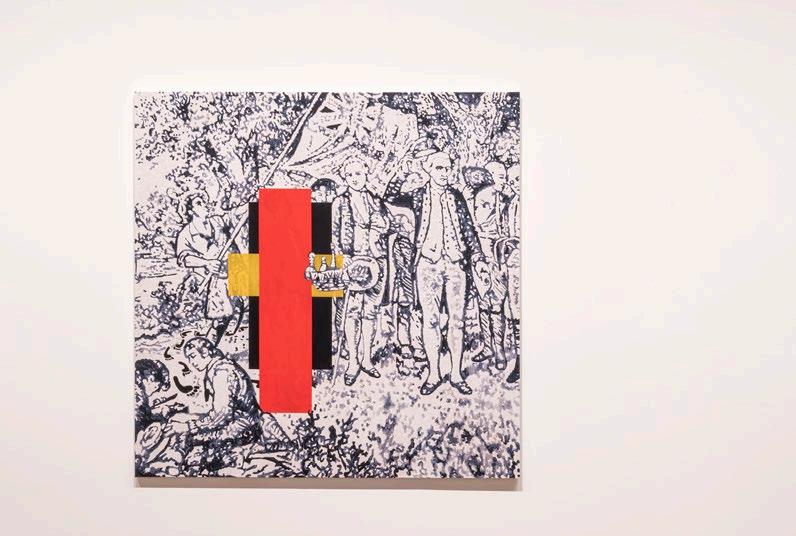
Gordon Bennett Possession Island (Abstraction), 1991 Oil paint and acrylic paint on canvas 1843 x 1845 mm
Tate and the Museum of Contemporary Art Australia, purchased jointly with funds provided by the Qantas Foundation 2016 ©Estate of Gordon Bennett. (Below); Exhibition view © Tate, Joe Humphrys

How would you describe your art?
I make large-scale paintings that are often figurative, their surfaces constructed by processes of layering, obscuring, and preserving traces of different registers of imagery. I try to make surfaces that are immersive, and that reveal different parts of themselves over time.
What inspires your work? The work
I am making at the moment concerns coloniser behaviour, and the role women have played, and continue to play in colonial processes in Australia. I make this work from my subject position as a white woman, and a beneficiary of colonisation. I feel it’s important to understand that the present and the past are fused.
Can you tell us a little about A Year in Art, Australia 1992 and the work that you’ll be showing there? This exhibition takes the Mabo Decision on land rights, handed down in 1992, as a departure point. The case, led by Eddie Mabo, acknowledged the Australian painter Helen Johnson talks to Anna Walker about the upcoming Tate show, A Year in Art: Australia 1992
Meriam people’s rights over Mer (Murray Island), which had implications for Indigenous claims to sovereignty throughout Australia and the Torres Strait. The exhibition brings together works by Indigenous and non-Indigenous artists to talk about Indigenous relationships to Country, and the continuing harm of colonial processes.
I’m exhibiting two works: one focuses on the Speaker’s Chair in the parliamentary chamber at Westminster, and the fetishistic replica of it installed in Parliament House in Australia, becoming a symbol of cultural cringe. The other painting deals with theft, and depicts a number of introduced species, both plants, and animals, that have become pests, disrupting the ecological balance; the proposition being that theft can involve bringing things in as well as taking things away.
What do you hope visitors take away from the exhibition? I hope it offers an opportunity for people to think differently about their own position as they encounter other perspectives, and to see some expressions of how colonisation remains a raw immediacy. n

A Year in Art: Australia 1992 is at Tate Modern until 2022. Visit tate.org.uk
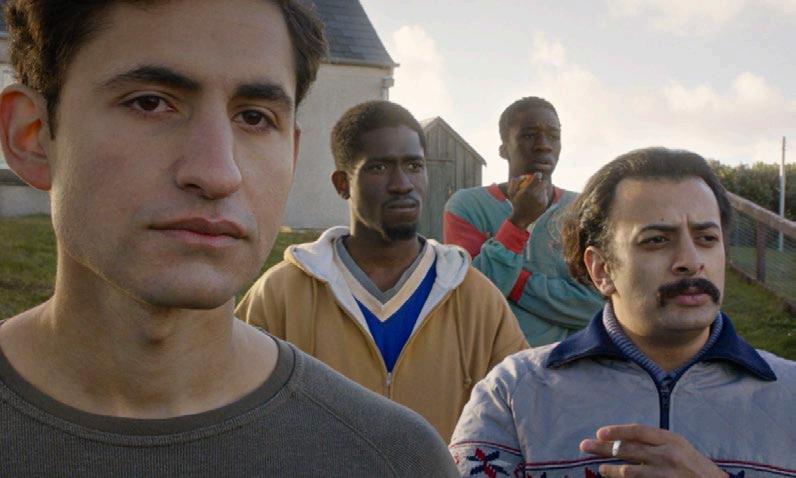
Opening scene: a grating five-minute dance sequence between a man and a woman to a cheesy 1980s ballad, with a group of baffled young men watching on. Whenever the man gets a bit handsy, she demonstratively pushes him away to illustrate the lesson written out on the blackboard behind them: Sex: Is A Smile An Invitation? You’d be forgiven for thinking you’re about to watch some off-the-wall Yorgos Lanthimos film but it is in fact the opening to a moving yet equally bonkers drama about the refugee experience. Made by a fresh new voice in British cinema, Ben Sharrock, Limbo tells the story of the aforementioned group of young men: newly arrived refugees who find themselves on a remote Scottish island, awaiting the results of their
asylum claims. The film serves many purposes: it’s a biting, laugh-out-loud satire; a heartfelt story of starting a new life in unfamiliar land—with all the fear, guilt and longing it involves; an elaborate piece of cinema where each frame does some heavy lifting.
But most importantly, it’s a loving character study that doesn’t scrimp on time for these vastly different individuals, brought together by a crisis. While to many of us they’re indistinguishable from the news headlines we read, Sharrock introduces them as real people with big personalities and passions; from the taciturn musician, Omar, to the benevolent, Instagram-cat-obsessed Farhad. The world needs more cinema like this.
By Eva MackevicFour more powerful films about the refugee experience

Beasts of No Nation (2015)
A war drama that centres around a child soldier fighting in an unnamed African country, Beasts aptly illustrates the shocking transition from an innocent child to a perpetrator of war, emphasising the psychological trauma that comes with it. Starring Idris Elba as a fierce warlord, this was Netflix’s very first original film.

First They Killed My Father (2017)
Based on a memoir of a human rights activist and lecturer Loung Ung, this harrowing biographical thriller depicts a seven-year-old Loung, who is forced to be trained as a child soldier while her siblings are sent to labour camps during the horrific Pol Pot regime. Directed by Angelina Jolie herself, it’s a multilayered, sensitively rendered film.

“The more immune you are to people’s suffering, the more dangerous it gets. It’s critical for us to maintain humanity.”
This deeply moving, often heartbreaking documentary was hotly talked about and lauded by critics upon its release. And for a good reason; filmed across 23 countries and several continents, it’s a sobering portrayal of the displacement phenomenon— the kind that has the power to open people’s eyes and hearts.
A documentary like no other, For Sama is a self-shot story of navigating motherhood during the bombings of the Syrian civil war. A sort of intimate video diary that was transformed into a film, the BAFTA-winning film shook audiences all over the world with its disturbing footage, including a birth sequence, in which the doctors perform a C-section, while bombs explode on the surrounding streets.

Four decades on, television has decided to revisit and reassess the 1980s. The oddly fascinating Physical (Apple TV+) casts the everexcellent Rose Byrne (Bridesmaids) as an overlooked Malibu housewife using aerobics as an escape from horrendous cycles of self-loathing and binge-eating. Although they’re clad in Day-Glo spandex and set flailing to a hi-NRG soundtrack, the show’s sharp elbows make for mixed viewing. Sometimes they nudge chuckles out of you; sometimes everything’s as awkward as its heroine. Still, that’s one compulsion here: watching a show work itself out as it proceeds.
More assured (if scarcely less eccentric) is On Becoming a God in Central Florida (Netflix). This one-season wonder, which suggests some adaptation of a lost Carl Hiaasen novel, has a terrific Kirsten Dunst as Krystal Stubbs, a can-do single mom waging war on
the social-selling household goods company that has left her badly in hock. Yet it also encompasses death by alligator, aquafit (or “Splashercise”, as Krystal has it), and singer Beth Ditto as an equally wronged consumer. A planned second season was cancelled when the pandemic hit; Season One ties up most of its loose ends in colourful fashion.
Closer to home, Gods of Snooker (iPlayer) provided one of the BBC’s early summer successes. Execproduced by Louis Theroux, this three-part retrospective of televised snooker’s heyday centres a trio of wildly disparate potters: the volatile Alex Higgins, the Zen-like Steve Davis, and the mercurial Jimmy White. It’s sublimely rich in archive, anecdote and texture, with music cues that can only spin you back— as will the footage of professional sportsmen merrily smoking and drinking tableside as their opponent fires in another 147. Different times, as they say.
 by Mike McCahill
by Mike McCahill
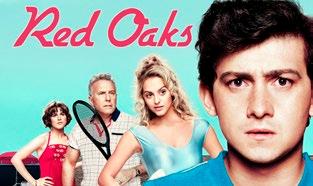
RedOaksS1-3 (Prime Video)
More heartfelt Eighties nostalgia, following artsy teen David (Craig Roberts) through wittily observed bonding rituals at a New Jersey country club.
House of Lull. House of When
by Alexis Marshall“
IAlso Out This Month…

’ve always hated going to Guitar Centre on tour. However, I love Home Depot. To shop for all my instruments at Home Depot was perfect for me,” says Marshall Alexis. And judging by the sound of his first ever solo album, he must have burned through the hardware store’s entire catalogue. A cacophony of scrap metal and construction materials, House of Lull harkens back to the noise of early industrial bands such as Cabaret Voltaire or Einstürzende Neubauten— abrasive, uncompromising, destructive. And that’s just the music accompaniment.
At the centre of this high-pressure, metallic chaos are Marshall’s anguished howls of heathenry: screaming into the microphone about the psychological turmoil of youth and nostalgia for lost innocence, he sounds like a spoken word poet at The Last Judgement—with scenes of torture and mutilation unravelling in front of the stage.
Having made his bones as the vocalist of the cult noise-rock band, Daughters, Marshall tackles timeless topics with a voice that pulsates with raw emotion and yet displays great control and an awareness of its own limitations.
A white-knuckle harangue-cum-confessional, House of Lull is not for the faint of heart—it cuts like shrapnel and mercilessly slashes at the very fabric of existence; yet it’s a truly original and affecting testament to what a man with a few padlocks and something to say can do.
by Eva Mackevic
Change
by AnikaA slightly more mellow but just as emotionally charged record also out this month is from the Berlin-based British expat, Anika. Her latest offering is a gorgeously recorded, lyrical musing on justice, belonging and the current state of the world, inspired by—you’ve guessed it—the pandemic. A former political journalist, Anika delivers her thoughts and feelings with a sober, objective perspective, and equally cool, detached vocals to match.
The music is bold and theatrical, embroidered with imaginative drum patterns and over-the-top synths. Perfect for fans of Nico, Aldous Harding and maybe even a bit of Marlene Dietrich.
John Boyne pokes fun at trigger happy tweeters and “cancel culture” with his latest effort
TheEchoChamber
John Boyne
Doubleday, £16.99
Sometimes it’s hard to imagine where a novelist gets his inspiration from.
Well, not in this case.
Two years ago, John Boyne—best-known for The Boy in the Striped Pyjamas—published a book for younger readers called My Brother’s Name is Jessica. Its impeccably virtuous aim was to provide a sympathetic portrait of a teenage boy transitioning to a girl. However, by using that word “brother” and referring to the pre-trans main character as “he”, Boyne found himself under attack on Twitter for being transphobic, with critics taking issue with him

James Walton is a book reviewer and broadcaster, and has written and presented 17 series of the BBC
Radio 4 literary quiz
The Write Stuff
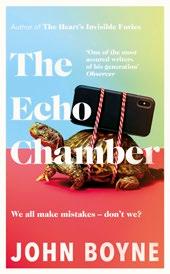
not realising that once someone identifies as a woman, that’s what they’ve always been.
Of course, what normally happens next is that the person then issues an abject apology, explaining how much they’ve learned since. Well, not in this case. Instead, in his new book for adults, Boyne comes out all guns blazing for a full-scale satire on the idiocy of social media.
Sixty-year-old George Cleverley is a popular TV interviewer and, in his own eyes, a good liberal. After all, he named one of his children after Nelson Mandela and he sponsors 18 goats in Somalia. Unfortunately, after discovering that his lawyer’s
receptionist is transitioning from Aidan to Nadia, George posts a tweet wishing “him” well with “his” transition. Sure enough, he instantly becomes a Twitter hate figure, abused as old, fat, racist, fascist, misogynistic and lots more besides—often by people using the hashtag “#Be Kind”. And from there, Boyne’s attack on modern media life broadens out in pretty much every possible direction.
Yet, while’s there’s no mistaking the book’s heartfelt nature, the experience of reading it is surprisingly joyous— largely, I’d suggest, because Boyne has such obvious fun getting in touch with his inner curmudgeon. Most of the comedy is broad to the point of irresistible farce. And, as it follows all five members of the Cleverley family through all manner of scrapes, The Echo Chamber turns out to be packed with great, rollicking story-telling— plenty of it not about social media.
This is a terrific novel for our times— although, if I were Boyne, I would avoid Twitter when it’s published.
Can you guess the writer from these clues (the fewer you need the better)?
1. He was born in Dublin in 1667.
2. The first name of the main character in his most famous book is Lemuel.
3. The Dutch word lilliputter, meaning a short person, comes from a place in that same book.
Answer on p126
Helen Macdonald (Vintage, £9.99). Lovely, thoughtful and sometimes sobering essays on the vanishing natural world from the author of H is for Hawk.
TheEveningandtheMorning
Ken Follett (Pan, £9.99).
The unstoppable Follett returns with another whopping historical epic, this one a prequel to his allconquering The Pillars of the Earth.
Jim Fraser (Atlantic, £8.99).
A leading British forensic investigator looks back on the most dramatic cases of his 40-year career.
TheBookofTwoWays
by Jodi Picoult (Hodder, £8.99).
In this SlidingDoors-style novel, Picoult once again combines great storytelling with an unforced exploration of what makes for a good life.
DearReader:The
ComfortandJoyofBooks
Cathy Rentzenbrink (Picador, £9.99).
Rentzenbrink’s memoir of the books that have meant the most in her life— from the Narnia Chronicles onwards— is a delightfully warm-hearted love letter to reading.
Adam Andrusier pens an eclectic memoir of his time as an autograph dealer

At this stage, Andrusier’s entire universe was the north London suburb of Pinner, where he grew up with his Jewish parents: a larger-than-life father and a mother it seems fair to call “long-suffering”. In fact, quite a lot of the book is a beautifully bittersweet memoir about Andrusier’s conflicted relationship with his father, from whom he learned the appeal of collecting—although his dad’s taste ran more towards postcards of Eastern European synagogues that were destroyed by the Nazis.
Meanwhile, following his Big Daddy triumph, young Adam expanded into writing off for autographs. But he also continued as an “in-person collector”, waiting outside London hotels to accost the likes of Elizabeth Taylor (who said no) and Nelson and Winnie Mandela (who said yes, but seemed to Andrusier to be unhappily married).
He also introduces us to the strange world of autograph conventions, where a winningly random assortment of celebs—from astronomer Patrick Moore
to the bloke who played Jaws in James Bond—sign for money. On a darker note, he sees a particularly long queue for the pilots who dropped the first atomic bomb cheerfully signing photos of the Hiroshima ruins.
These days, Andrusier makes his living as an autograph dealer. But here he is as a boy, a couple of years after a family holiday in California, about to make his nascent collection more international:
One day, Dad had a thought. He disappeared into his study, and after a lot of groaning and throwing paper around he emerged clutching a brightly illustrated brochure. It was a ‘Beverly Hills Star Map’.
‘I’d forgotten all about this,’ he gleamed. ‘Might be useful.’
That map was more than useful. It had little stars that showed you exactly where the old-timers lived. I remembered, now, how we’d used the map on our trip in California. We’d seen hedges trimmed at Gene Kelly’s residence and watched a man in overalls arriving at Spielberg’s place with a pot plant. Other than a torn, missing corner, they were all right there, and now I knew how to find them.
I deluged Beverly Hills with letters of admiration.
‘Who’s Fred Gwynne?’ I demanded of Dad. ‘Is he famous?’
‘Yes. The one from
whatchamacallit—The Munsters.’
‘What about Dick Sargent? And Dom DeLuise?’
‘I don’t know those two. But have you thought about writing to James Cagney? A huge star! And Phil Silvers?’
A few weeks later, the first Hollywood autograph arrived: a large photo of James Cagney, showing him anciently old, and signed in a shaky hand, ‘To Adam, Jim Cagney.’
‘But is that actually him?’ Mum queried. ‘He looks like a prune.’
‘The man’s eighty-five years old,’ Dad reasoned.
Other signed photos came in from James Stewart, Kirk Douglas and Gene Kelly; smiling, glamorous shots arrived from Lauren Bacall, Kim Novak and Hedy Lamarr.
‘Ooh, Lauren Bacall was lovely,’ said Dad. ‘And did you know Hedy Lamarr was the first actress to appear completely naked on screen?’ He pursed his lips and blinked a lot.
The biggest success, though, was

Frank Sinatra. He’d been missing from the map—presumably in the torn-off corner—so I’d addressed an envelope simply, ‘Frank Sinatra, U.S.A.’ Dad said I didn’t stand a chance in hell. Not only did Frank get my letter, but he sent a colour photo of himself singing, and in silver ink wrote, ‘Sincerely yours, Frank Sinatra’. My father was gobsmacked by this achievement, and even though I hadn’t seen any of Sinatra’s films or heard him sing a note, that one became my favourite. I separated it from the main collection and Blu-tacked it to my bedroom wall. When parents’ friends came over, Dad would say, ‘Go on, show them the Sinatra,’ as if that photo had become ‘ours’.
While I was grateful for the autographs I got, I thought mostly about the ones that seemed unobtainable, like mean old Danny Kaye, who never replied, and stingy Charles Schulz, who was always too busy to draw a lousy Snoopy. Katharine Hepburn wasn’t playing ball, either. She had a smug secretary reply on her behalf: ‘I’m sorry, but Miss Hepburn doesn’t sign or send autographs.’ I’d write back, detailing the extent of my admiration. ‘I’m sorry,’ came the next reply, ‘but it’s Miss Hepburn’s policy not to sign autographs for people she doesn’t know.’ Miss Hepburn didn’t know me? I’d written nine times.
“A great entourage of motorcycles rushed towards the hotel, followed by a dozen limousines. This was it. Yeltsin arriving. The cars pulled into the kerb at the exact same moment, and out streamed at least a hundred men in suits. Some walked, others jogged, all heading to the hotel’s back entrance. One KGB officer assigned himself to me alone and marked my every move.
‘I only want an autograph!’, I exclaimed.
And then I saw him. Or rather, it: Yeltsin’s white hair, sprayed rock-hard, unwavering in the breeze. The Russian leader pounded the pavement like a bear, his fists raised in the air, a wild drunk making one last important point before being dragged to bed.
‘Mr Yeltsin!’ I called. ‘Could I have your autograph?’
And I saw his head jerk in my direction. He’d definitely heard me. Then he let rip what could only be described as a long and doleful grunt. I took it as a firm ‘No’.”
And the name of the author is… Jonathan Swift—author of Gulliver’s Travels. In the first part of the book, Lemuel Gulliver famously arrives in Lilliput, whose inhabitants are around six inches tall (shorter than even the shortest Dutch lilliputter).

Matthew Kneale is the award-winning author of fiction and non-fiction including English Passengers which won the Whitbread Book Award. His latest book is The Rome Plague Diaries published by Atlantic Books (£14.99)



As a child I loved the Tintin books—for their adventures, their characters and their stylish illustrations. Though Hergé visited almost none of the faraway places he drew, he captured them perfectly. His images, whether of Peru, Arabia, India or China, stayed with me and later, when I became a keen traveller, Tintin’s destinations were the places that I most wanted to reach. I never saw them all, needless to say, but I got to quite a few.
This was another book I loved as a child—the story of a boy who is bored staying with his grandparents, when he runs into Stig, an amiable Stone Age man. When my father read it to my sister and me, I was already fascinated by history and I loved the way the book captured the mystery of our distant, unrecorded past. Its aura stayed with me and much later I spent many a weekend driving around Britain, getting lost on small country roads, looking for prehistoric tombs and stone circles. There’s something breathtaking about these places, which are often in extraordinary locations.
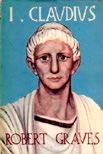
When I first saw Rome, aged eight, I was amazed by the city’s layers of history and this same magic led me to come and live here, 20 years ago. I first read IClaudiusas a teenager and was captivated by the story of amiable, stammering, ridiculed Claudius, who grows up in the vipers’ nest of Rome’s imperial family and who, against all the odds, as his relatives destroy one another, survives and rises. Graves, a fine scholar, has a talent for making the past spring to life, in all its nastiness and wonder. In my own writing, fiction and non-fiction, I’ve tried to follow his example—to make history astound, as it should do.
James O’Malley on how the internet kept working, even during lockdown
When we first locked down last year, much of our world was thrown into chaos. But one thing we never had to stress over was our favourite websites and apps going down. Facebook continued to work just fine. Zoom and FaceTime continued to take our calls. And Netflix was always a dependable source of a new show to binge.
This is something we take for granted, but it doesn’t happen by magic. In fact, over the last decade or so, the behind the scenes infrastructure that keeps the internet chugging has been transformed by a technology that means we don’t have to worry about websites and apps falling over. Technologists call it “The Cloud”, and it is really rather clever.
When your computer loads a website or an app retrieves information, what it is doing is
connecting to another computer—a server—and downloading the information from it. The problem is that when a page becomes popular and lots of people try to connect to the same computer and download it at the same time, it creates a digital traffic jam. That’s when you’ll encounter the never-ending loading bar, or the endless buffer-wheel…
The most popular websites are not stored on single computers. The way to get around this traffic jam problem is to store the same page on multiple computers—the digital equivalent of a popular store opening new branches so not everyone has to drive to the same place.
Traditionally, this meant that every company would build and maintain its own “data centre”, or rent space in data centres maintained by others, each packed with computers containing copies of the very same website.
But even data centres have their limits. If demand for a website
suddenly spikes—say, tickets are suddenly put on sale, or a new episode of a popular show has been released for download—then the same traffic jam problem can still occur, on an even larger scale. And this was annoying, as it meant that companies had to choose between
either paying for much more capacity than they actually need for the rare occasions when demand is high, or making it more likely their websites and services would fall over when too many people turn up at the same time.
This was a problem that Amazon faced in the early 2000s when it had a revelation: what if the company could build a really, really big datacentre (or rather, network of datacentres), and it could instead build its website so that when demand increases, copies of the popular pages are automatically copied on to new computers?
Yes, this would be hugely expensive. But this is where Amazon hit upon another great idea: rather than keep these enormous data centres and all of that capacity to itself, it could let other companies use
the technology too. It’s unlikely that everyone would be in demand at exactly the same time, so by selling excess capacity to other companies, it could balance out the demand.
Amazon Web Services (AWS), as the Cloud arm of the company became known, was a huge success when it first launched cloud services in 2006. In fact, it’s now actually more profitable for Amazon than the online store that we’re all familiar with. And AWS is the digital plumbing behind the scenes on vast swathes of the web that we use today. Facebook, the BBC and even the British government’s own website all use AWS. And even though Amazon operates its own Prime Video service, it also counts Netflix as one of its cloud customers.
This is just scratching the surface of how the cloud has changed the world. There are now vast amounts of computing power that can be easily accessed by anyone with an idea—no need to buy a ton of equipment. Backing up data is much safer, as the Cloud can easily store everything without running out of space. And working from home is possible as cloud apps work wherever you are.
But perhaps most importantly? It means that even when life becomes incredibly weird at incredibly short notice, and even when demand for streaming video and other digital services sky-rockets, those endless loading screens are at least stuck in the past. n
Win £30 for your true, funny stories!
Go to readersdigest.co.uk/contact-us or facebook.com/readersdigestuk
Before my daughter started school, she was playing one day with a pencil and paper. She asked me, “How do you do 'I's'?”. I thought this would be a good time to go through the whole alphabet with her.
When we had finished she went back to her pad of paper. Then she showed me her drawing of a face and asked again: “How do you do eyes?”
LUCY PESARO, MiddlesexOne morning, in a state of complete desperation, I said to my four young children, “If anyone can find my glasses, I will give you a reward.”
They disappeared to hunt around the house. After five minutes of searching unsuccessfully my son came back to me and asked, “Can you give me a clue?”
JO WHITE, LancasterWe were driving along the M5 passing Worcester when we spotted a helicopter coming in to land.
I explained to my young son that it could be a top jockey flying in to take a ride at the racecourse.
“Do they fly in on a helicopter?”
“Yes, sometimes” I replied.
His response?
“Does the horse go too?”
PAUL GILLON, West MidlandsTo my embarrassment, my son's primary teacher told me she was teaching her class a lesson about right and wrong, and she'd told the class as an example: "If I were to get into a man's pocket and take his wallet out with all his money in, what would I be?"
My six-year-old son, Jay, answered with a confident air, "You'd be his wife."
SHONA LLOYD, ClwydOnce, my wife and I hired a white camper van. After a long drive, we parked in a lay-by for lunch when a woman went up to my wife's window and asked what we had got. "Marmite sandwiches," said my wife, surprised.
"Huh!" said the woman and marched off. I think she thought we were an ice-cream van.

ANDREW BERRY, Lincolnshire
While wandering around a local hardware shop and passing a display of bathroom suites, I witnessed a harassed mother turning around in horror and picking up her three-year-old son who was in the process of pulling down his trousers while the confused child protested loudly, “But Mam, I have to go!”
MCNAMARA, County Limerick
During the last lockdown we had a childcare bubble with our daughter and family. We helped out with home schooling our six-year-old grandson, Jacob.
One day we watched a video of The Enormous Turnip story where all the family including assorted
animals help to pull out the enormous vegetable.
At the end, the question was, "What have we learned from the story?", eg, helping each other, teamwork and so on.
And what was Jacob's reply? "Not to grow turnips!"
MARY POOLE, WorcestershireWhile flicking through the TV channels with my six-year-old step-niece…
Her: Why don’t you have kids?
Me: Well, it’s not that I don’t want kids, I just haven’t mset somebody yet who I love enough to have children with. I’m sure it will happen one day!
Her: No, I meant why don’t you have kids TV channels?
ALISON FRY, East SussexIt’s never been easier to enjoy the world’s favourite magazine!







Each must-read monthly issue covers life, culture, health, books, films, food, humour and travel alongside in-depth news features, memoirs and celebrity profiles.
YES I want to subscribe to Reader’s Digest Magazine for just £3 for 3 issues (a saving of £8.37 on the shop price of £11.37 based on the cover price of £3.79 per issue). I understand that if I do not wish to continue receiving Reader’s Digest after my first 3 issues I can simply cancel my subscription by contacting customer services. If I do want to continue to subscribe after my first 3 issues I need do nothing and my subscription will automatically be renewed at the low rate of £7.50 for every 3 issues until I decide otherwise. Name: Address: Postcode: Telephone: Email:
Return your completed form to: Reader’s Digest, The Maltings, West Street, Bourne PE10 9PH
Or call us today on 0330 333 2220 Quoting code RDN089

Hope you don’t mind, but we’ve mined the lexicon for examples of homophones—sound-alike words with different spellings and meanings. Who says mistaken identity can’t be fun?
BY ROB LUTES1. nock—A: notch on an arrow that fits the bowstring. B: cap on a fence post. C: large, exposed tree root.
2. bight—A: raised centre of a roadway. B: curve in a coast forming a bay. C: degree of hardness of ice.
3. buccal—A: trunk of a tree. B: thin membrane under an egg shell. C: relating to the mouth.
4. frieze—A: horizontal band of sculpted or painted decoration. B: type of meringue. C: footbridge.
5. cession—A: extreme air pollution. B: act of giving up. C: a pilgrimage.
6. clew A: mix vigorously with water. B: provide with spiritual understanding. C: lower corner of a sail.
7. naught—A: nothing. B: imminent harm. C: middle of nowhere.
8. awl—A: young raccoon. B: narrow ditch. C: sharp-pointed tool.
9. rede—A: advice. B: constructive criticism. C: fear of the unknown.
10. offal—A: animal organs used for food. B: tea made from dried dung. C: choral works from the baroque period.
11. plait—A: question asked in a forceful way. B: twist together into a braid. C: ease someone’s grief.
12. limn—A: depict in words or by drawing. B: adorn with flowers. C: run quickly.
13. indite—A: control by force. B: compose. C: organise into groups.
14. pique—A: sudden feeling of annoyance. B: opaque pottery glaze. C: purity.
15. loupe—A: now-extinct wildcat breed. B: quill writing implement. C: small magnifying glass used by jewellers.
1. nock—[A] notch on an arrow that fits the bowstring; Expertly sliding the bowstring into the nock, Jamal prepared to shoot the apple off the distant stand.
2. bight—[B] curve in a coast forming a bay; The bight was the only place along the coast calm enough to snorkel.
3. buccal—[C] relating to the mouth; The buccal phase of swallowing ends with the tongue pushing food into the throat.
4. frieze—[A] horizontal band of sculpted or painted decoration; The room was a marvel of design, capped by the delightful tiled frieze on the west wall.
5. cession—[B] act of giving up; The sheik’s eventual cession of the long-disputed border territory was a sign to the world that diplomacy had succeeded.
6. clew—[C] lower corner of a sail; I grabbed the clew and, moving it from side to side, helped steer the boat.
7. naught—[A] nothing; Standing at the edge of the sinkhole that just swallowed his house, Fabian thought of how his years of hard work had come to naught.
8. awl—[C] sharp-pointed tool; Paola marked the leather at even distances with an awl before stitching the leather pouch.
9. rede—[A] advice; Facing any tough choice, Andrei always sought rede from his brother.
10. offal—[A] animal organs used for food; To her own surprise, since marrying a butcher, Nara has developed a taste for offal.
11. plait—[B] twist together into a braid; Aimée grudgingly allowed her stepmother to plait her hair.
12. limn—[A] depict in words or by drawing; The street artist used pencil to limn tourist likenesses.
13. indite—[B] compose; He would often stop in the middle of a conversation to indite a poem.
14. pique—[A] sudden feeling of annoyance; Hearing her father’s voice brought a moment of pique, but Lynn greeted him affectionately.
15. loupe—[C] small magnifying glass used by jewellers; Elena brought the loupe right up to her eye with one hand and held the diamond with the other.
VOCABULARY RATINGS
7–10: fair
11–12: good
13–15: excellent

After spending far too much time on apps and social media over the last few years, Gemma decided it was time for a change.
“I’d started to get really frustrated with how I was spending my spare time”, said Gemma, 54 from London. “One day, I realised I’d checked my phone over 100 times. Something had to give.”
“So, I deleted my social media apps from my phone and made a promise to myself to do something more positive with my time.”
At first, it wasn’t easy for Gemma to find things to do.
“I’m embarrassed to admit that I’d stopped reading as much over the last couple of years. But, then a friend recommended Readly to me. I’d always loved reading magazines and thought it was time to give them a go again.
The selection is amazing: food, fitness, lifestyle, culture, crafts and

hobbies are all covered. I’ve been using Readly in the evenings to relax instead of watching TV. I’ve also found it great for inspiration and ideas for new recipes. We’ve been doing some re-decorating, so the interior design section has been really helpful. Having so many past issues to browse through is just fantastic. I can’t think how much I would’ve had to spend to get all that content. If you read more than a couple of magazines, you’ll be saving money each month.
My husband loves the car, sport and business magazines. And we cuddle up and do the puzzles and crosswords together now as well!
As it’s a family membership, I’ve shared my subscription with my daughter who has started using it. She’s a teacher and loves getting inspiration from the kids news, science and history magazines.”
To find out more about Readly, and to try 1 month for free, please go to www.readly.com/digest
Challenge yourself by solving these puzzles, then check your answers on p139
How to play:
Draw a line from each number to an outlet. Each line should pass as many empty squares as the number indicates. No square remains empty, and no outlet remains unused.

How to play:
Enter in each row and column the letters A, B and C in such a way that no row or column contains the same letter twice. The letters outside of the grid indicate what letter is encountered first from the direction of the arrow.
How to play:
Insert the numbers 1 to 6 just once in each a) row, b) column, c) bold outlined area and d) white or grey rectangle.
ExamplE:
BEwarE! The bold outlined areas are no longer 2x3!
Each letter in these equations stands for one of the seven numbers listed below. No two letters have the same numeric value. Match each letter to a number to make the equations work.
Did you know that the cosmetics juggernaut that is Avon was established all the way back in 1886? That means it’s been around for a whopping 135 years! You may also be surprised to learn that it was founded by a man— David H McConnell, who was a travelling book salesman. He offered beauty products as a perk, but soon realised that the customers—largely consisting of housewives—were much more interested in the perfume samples rather than the books. And the rest, as they say, is history…
WIN £30 for every reader’s joke we publish!
Go to readersdigest.co.uk/contact-us or facebook.com/readersdigestuk
My uncle was found dead in a vat of Tippex. The police say that there’s no suspicious circumstances, but I’m beginning to suspect a cover-up.
Comedian GARY DELANEYInterviewer: How do you explain the four-year gap in your CV?
Me: That’s when I went to Yale.
Interviewer: Wow, that’s very impressive. You’re hired.
Me: Thanks, I really need this Yob.
Seen on Twitter
Did you hear about the man with chronic dandruff who was attacked by a shark?
They found his head and
shoulders on the beach.
STEPHEN THOMAS, DenbighshireThe grammar police are campaigning for people to get tougher sentences.
Seen on Twitter
Guy who invented the clock: There will be 12 numbers on the face.
Friend: So the day will be divided into 12 segments?
Inventor: No, 24
Friend: So will the day start at 1?
Inventor: The day will start at the 12, which is at night.
Friend: …
Inventor: The six means 30.
Seen on Twitter
How do you get down from a camel? You don’t, you get down from A GOOSE!
Seen online
So you have your own personal tormentor? Well, bully for you.
Seen on Reddit
I knew that my ex-girlfriend was going to dump me so I set up a user called “Add Profile” on her Netflix account and I’m still watching three years later…
Submitted via email
I used to get teased at school for looking like a bowl of custard. Luckily I have a thick skin.
Seen on Twitter
Some comedians like to make jokes about the difference between cats and dogs. But I consider it too petty.
Seen online
Why on earth are we calling it a “gym membership” and not a “fitness protection programme”?
Submitted via email

RUSSIAN ARTIST VADIM SOLOVYEV MANIPULATES PHOTOGRAPHS TO CREATE THESE GIANT CRITTERS via boredpanda.com


A magician was working on a cruise ship in the Caribbean. The audience would be different each week, so the magician allowed himself to do the same tricks over and over again. There was only one problem: the captain’s parrot saw the shows each week and began to understand how the magician did every trick.
Once the parrot understood, he started shouting in the middle of the show: “Look, it’s not the same hat!”, or, “Look, he is hiding the flowers under the table”, or, “Hey, why are all the cards the Ace of Spades ?”
The magician was furious but couldn’t do anything; it was, after all, the captain’s parrot. One day the ship had a tragic accident and sank. The magician found himself on a piece of wood in the middle of the ocean with the parrot, of course.
The magician and the parrot stared at each other with hate, but did not utter a word. This went on for a day, and another and another. After a week, the parrot said: “OK, I give up. Where’s the boat?”
Seen on Reddit
I once hired a limo, but when it arrived, the driver walked off. I said “Excuse me? Aren’t you going to drive me?”He said the price didn’t include a driver… so I’d spent £400 on a limo with nothing to chauffeur it!
Submitted via email

Twitter users share some of the pearls of wisdom given to them by their fathers
@SethQP: My dad swore that constantly patting your belly was as good for you as sit ups.
@CallMeBiscuits: He told me, “Always pay your car payment before your house payment. You can sleep in your car but you can’t drive your house to work.”
@JohnnyWright711: My dad always told me not to ride The Zipper at the county fair because it “Kills five to seven people a year”. I still have no clue where this statistic came from.
@AndyRysta: When my car is making a strange sound, my dad tells me to turn the radio up louder.
CROSSWORD ANSWERS
Across: 9 Ghost town, 10 Hello, 11 Easel, 12 Beginning, 13 Demister, 14 Safest, 15 Eddy, 16 Worse, 18 Dole, 22 Detain, 24 Sleepers, 25 Orangutan, 27 Ether, 29 Keels, 30 Sweet talk
Down: 1 Ogle, 2 Consumed, 3 Stylish, 4 Sombrero, 5 Snag, 6 Chinwag, 7 Alpine, 8 Songstress, 13 Dreadlocks, 17 Silenced, 19 Overheat, 20 Disgust, 21 Deserts, 23 Trader, 26 Tusk, 28 Rake

Think of a witty caption for this cartoon—the three best suggestions, along with the cartoonist’s original, will be posted on our website in mid-August.
If your entry gets the most votes, you’ll win £50.
Submit to captions@readersdigest.co.uk by August 7. We’ll announce the winner in our September issue.

Our cartoonist’s is dancing a happy jig as he’s regained his crown this month with his simple yet effection caption, “I’m distancing” winning in a voting landslide! Think you could do better? Enter using the details above for the chance to steal the title in September…
cartoons by Royston Robertson

Pulp frontman and Britpop legend on his life and career

PRESERVING MUSIC
Step behind the scenes of the fascinating world of music archiving

If I Ruled The World Jon Batiste
The Oscar-winning musician shares his vision of a perfect world
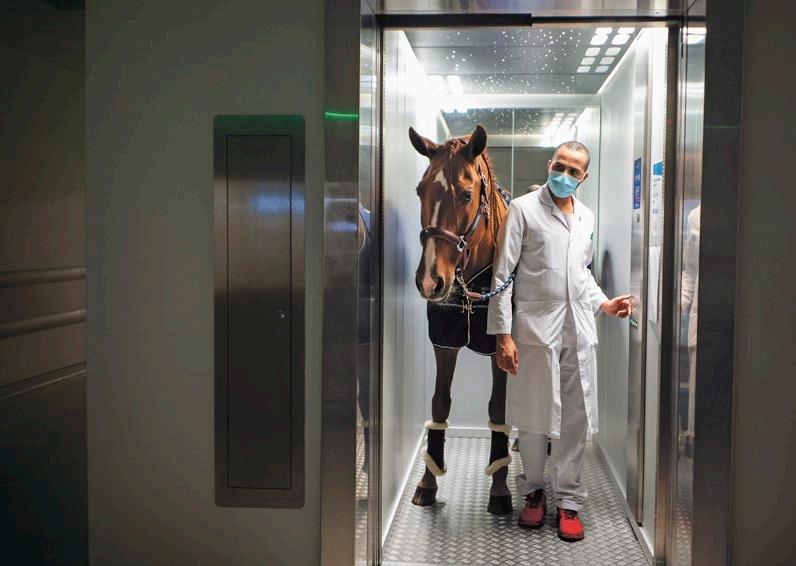
mental health In hospitals across the world, therapy dogs are used to comfort the sick. The Calais Hospital in northern France has a more unusual helper: Peyo, a 15-year-old chestnut stallion who had been a professional dressage horse. His trainer, Hassen Bouchakour, says Peyo has always gravitated to people with physical or mental illnesses. “It’s visceral,” Bouchakour says. “He needs to go to, and cling on to, the specific person he has chosen.”
In 2016, after Bouchakour retired Peyo from dressage, he started
bringing him to the hospital, and they now visit twice a month. Peyo clops from room to room visiting patients, many of whom find it comforting to pet him and have him watch over them. Children ride through the hospital’s halls on his back, and Peyo stays with palliative patients right until the end—one man even requested that the animal attended his funeral. The therapeutic effects are real: doctors report that patients in Peyo’s company often require less pain medication and have reduced stress.
Peyo with his trainer, Hassen Bouchakour


‘CONTROL FREAK’ is a novel about love, marriage, relationships and control. It is the story of Josephine, a young and somewhat naive woman, who finds John, the love of her life. Or so she thought. Everything is wonderful. That is until they are married. Then things change, not immediately, but day by day, week by week, month by month. But because there is no out and out physical violence, it takes her time to realise she is in an abusive relationship. That the love is gone, if there ever was any. But what will happen when she decides to end the relationship?









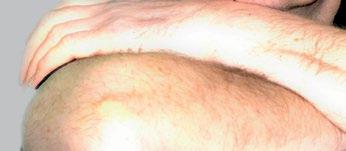


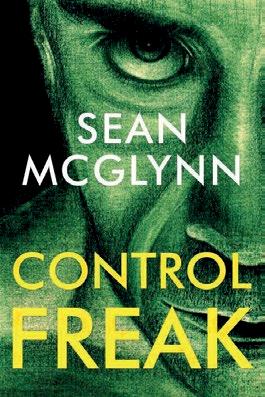


Sean McGlynn is a retired solicitor/ lawyer from, and living in, Letterkenny, County Donegal, Ireland. He is married to Catherine for over forty years and is a father, and grandfather. As a solicitor he ran his own practice from 1990 to 2011. During that time he has dealt with many legal issues, including the abuse of women by their partners. One victim, sadly, did not survive. ‘Control Freak’ is his first novel based on his experiences.
facebook.com/sean.mcglynn.752
‘Control Freak’ is available in paperback and e-book from Amazon.co.uk, paperback available from Waterstones, W.H. Smith, Foyles.co.uk, Brownsbfs.co.uk or directly from Pegasuspublishers.com from £8.99.




















































YES! I want to order the strictly limited 'History of Aviation' complete set of 12 stunning strikes (Item No. 196-257-0) – please choose: ❑ I would like to pay in 5 monthly interest-free instalments


All orders are subject to availability and acceptance. Please allow up to 28 days for delivery. All items are sent under Windsor Mint's 60-day NO OBLIGATION GUARANTEE. If you do not return any item(s) within 60 days you agree to pay the invoiced price. By placing an order you are confirming you are 18 years or older. All prices include VAT at the current rate. A credit check may be carried out. You may stop collecting at any time by simply notifying us. In order to send you information and special offers from us and selected other companies, we work with your data on the basis of the GDPR, Art 6 (1f), also with the help of trusted suppliers. You can find further information in our privacy statement, which you can see at any time on www.windsormint.co.uk or request in print from our customer service. You can cancel the use of your details for marketing purposes at any time by sending a simple message to Windsor Mint, 11 Lowesmoor Wharf, Worcester, WR1 2RS.
























